On the Peace Trail in Locarno- by David Roberts
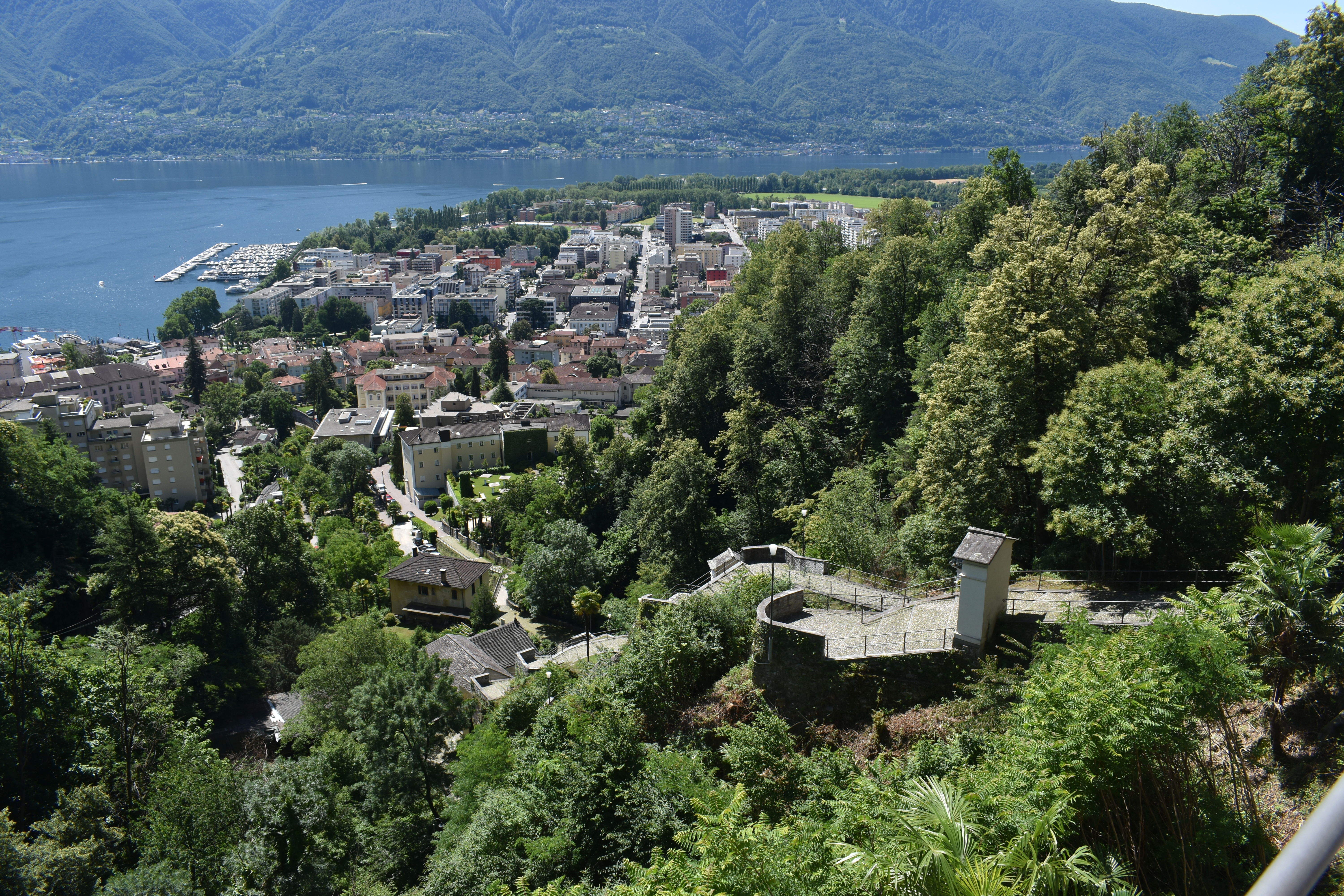
Having last year had the opportunity to visit the Italian City of Rapallo , this year I found myself on a quick trip to another City of Peace, the charming Swiss resort of Locarno. In October 1925, this lovely and sunny lakeside resort became the centre of negotiations for what would become the Locarno Treaties. At the time the people of Europe believed that “the Spirit of Locarno “ really did offer a hope of lasting peace and that the principal European Powers had once and for all renounced war as an instrument of foreign policy . unfortunately, it was not to be the case.
The British, French , Belgian, German and Italian legal advisors had already met in London from 1 to 4 September for preparation work for the conference of Foreign Ministers On 15 September , Germany was formally invited to the conference of Foreign ministers , she accepted on 26 September, suggesting, Locarno as a venue and conference could start on 5 October . The Germans then immediately threw a spanner in the works by having their Ambassadors to France, Italy, Britain and Belgium deliver a note verbale demanding that the Allies officially repudiate Germany’s War Guilt and make a commitment to evacuate the occupied city of Cologne. For the sake of French opinion the Allies’ were forced to reject the German note, although they did so quite moderately in public. Behind the scenes , Chamberlain was incandescent. He wrote to D’Abernon, the British Ambassador in Berlin, saying
“God forgive me if I have allowed myself to be duped by the Germans, but either Stresemann is crooked and a coward , or the value of any pact which may be made is, for the present , singularly discounted by the opposition which he meets”
The disagreement did not lead to the postponement of the conference. There were total of 121 delegates to the conference – the German delegation was the largest with 40 delegates. some 200 gentlemen of the world’s press were in attendance. There is no mention as to whether there was an official wife’s programme, bur certainly Chamberlain’s wife, Ivy was present. Mrs Chamberlain later received a Damehood for her services to diplomacy
Negotiations were led by British Foreign Secretary Austen Chamberlain. The participants included German chancellor, Dr Hans Luther and Foreign secretary Gustav Stresemann, the French foreign Secretary Aristide Briande , for Italy Benito Mussolini and for Belgium prime Mister Emile Auguste Vandervelde.. Mussolini did not spend the whole time in Locarno, but turned up towards the end. There were also representatives from Czechoslovakia and Poland, who while not part of the mutual Agreements participated in separate agreements with France and Germany.
Chamberlain’s natural courtesy helped him and he showed great attention to details. For example, he requested that the table for the Locarno conference should place no country above any other. Most of the negotiating was done in small groups in hotels, ‘tea party diplomacy’ as it was named, rather than in large groups.
Today. Locarno is still a very prosperous Swiss resort city, ideal for a weekend break. It boasts one of the nicest public lidos I have ever seen, with fantastic views up the Lake. It is crowded with Swiss and foreign tourists taking the sun and enjoying the pleasures of the lake. It also boasts the Peace Trail, which takes in some of the historic sites of the Locarno Conference and celebrating its role as a City of Peace.
I stayed in the Hotel Esplanade , now more prosaically known as “e-rooms Minusio”. It is high up above the town on the Via del Vigne, with a spectacular lakeside view and indeed there are some vineyards around as well. The Esplanade was the home of the German Conference Delegation to the Locarno Conference. , while the British, French, Belgians, Italians, Czechs and Poles stayed in the town centre. No longer a Grand Hotel, the e.-rooms Minusio is clean and efficient in typical Swiss style , if rather soulless. It now has a fully online checking in system and no reception staff. Although clearly, substantially renovated, it is still the same hotel that German Chancellor, Hans Luther, Foreign Secretary Gustav Stresemann, and the rest of the German delegation used as their base. From here they could take a ten-minute drive down for consultations with the other delegations in the centre of Locarno. The view from the gardens and front terrace of the hotel is spectacular, albeit these days interrupted by several modern developments on the lakeside and a modern residence for “seniors” across the road. Locarno with its lovely location, seems to be a notable centre for Swiss retirement homes. I imagine that before the modern developments went up, the hotel was extremely quiet and isolated and a good place for the German delegation to collect their thoughts .
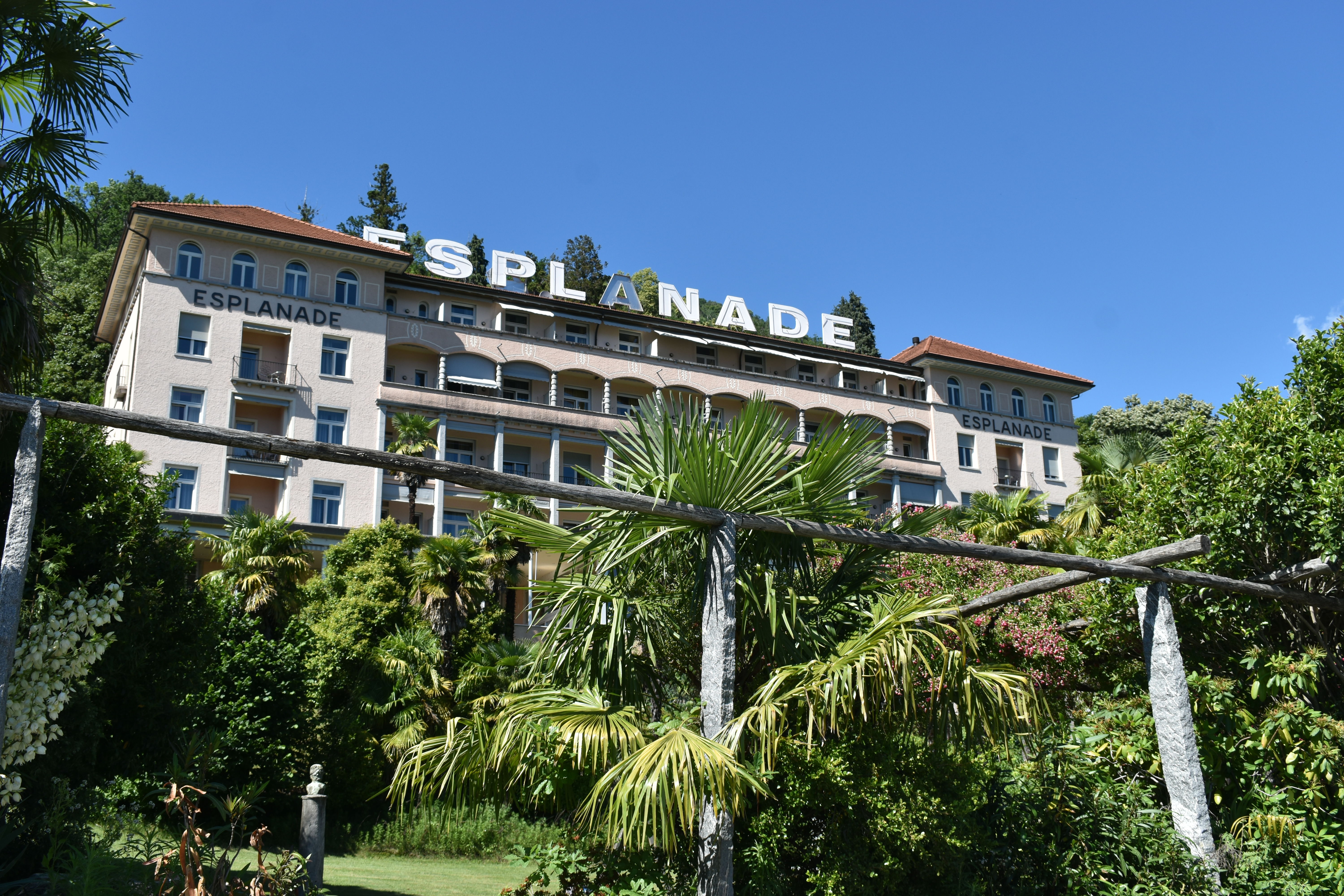
The German Delegation stayed at the Hotel Esplanade, now "E-rooms , Minusio"
Hans Luther was born in Berlin on 10 March 1879 into a well-off merchant family. After attaining the Abitur at the Leibniz-Gymnasium/Berlin, Luther studied law at Geneva, Kiel and Berlin, In 1907, Luther was elected to the Magdeburg city council where he litigated against the regional potash industry for polluting the drinking water. In the summer of 1918, he became Oberbürgermeister of Essen. During the Revolution he managed to convince the revolutionary workers' and soldiers' councils to cooperate with the city administration and to accept the mayor's leading role. On 1 December 1922 Luther took over the Reichsministerium fur Enthrone und Landwirtschaft (food and agriculture). remaining in this office in the cabinet of Gustav Stresemann, focussing on ensuring food supplies for those groups of the population hardest hit by inflation. When Stresemann reshuffled his cabinet on 6 October 1923, Luther took over the Ministry of Finance and kept that portfolio in the two cabinets led by Wilhelm Marx which followed. Luther thus was in charge of the currency reform which ended the hyperinflation and introduced a new stable Mark. The restrictive monetary policy by Hjalmar Schacht at the Reichsbank helped to stabilize the currency, as did steps taken by Luther to close the budget deficit. On the revenue side, he pushed through three emergency tax hikes, brought forward due dates for taxes, increased prepayments of assessed taxes, raised the sales tax, taxed inflation gains and reorganized the financial burden sharing between Reich and Länder. On the spending side, Luther managed a drastic cut in personnel costs – by reducing the number of Reich employees by almost 25% over four months, a freeze on promotions and fixing public salaries at a level lower than that of 1913. Luther then was a member of the German delegation at the London conference of 1924 in July and August 1924, where he was in charge of trade policy and financial policy issues. On 30 August 1924, the Rentenmark was replaced as legal tender by the Reichsmark, a new gold-backed currency. After the indecisive Reichstag elections of December 1924, the parties supporting the minority Marx cabinet President Friedrich Ebert on 9 January 1925 asked the independent Luther to form a government. On 16 January, Luther presented a cabinet that combined features of a party-based government with one made up of experts/technocrats.
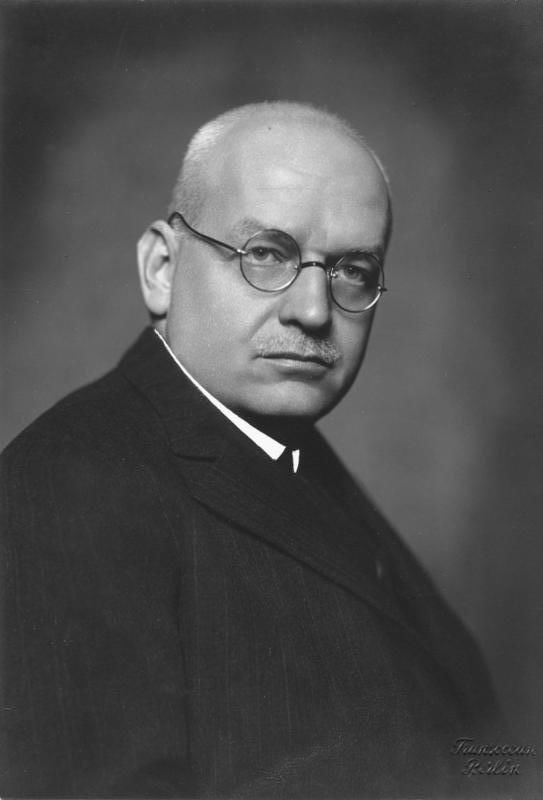
Hans Luther
By Bundesarchiv, Bild 146-1969-008A-07 / CC-BY-SA 3.0, CC BY-SA 3.0 de, https://commons.wikimedia.org/w/index.php?curid=5482506
Gustav Stresemann was born on 10 May 1878 in 66 Köpenicker Straße in Southeast Berlin. His father worked as a beer bottler and distributor, and also ran a small bar out of the family home, as well as renting rooms for extra money. In an essay written when he left school, he noted that he would have enjoyed becoming a teacher, but he would only have been qualified to teach languages or the natural sciences, which were not his primary areas of interest .In April 1897, Stresemann enrolled at the University of Berlin, where he was convinced by a businessman to study political economy instead of literature, in 1898, he transferred to the University of Leipzig for a doctorate. He studied history and international Law, He completed his studies in January 1901, submitting a thesis on the bottled beer industry in Berlin, Initially, Stresemann was associated with the left wing of the National Liberals. During World War I, he gradually moved to the right, expressing his support of the monarchy and Germany's expansionist goals. However, he still favoured an expansion of the social welfare programme. After the war, Stresemann briefly joined the German Democratic Party, formed from a merger of the Progressives with the left wing of the National Liberals. However, he was quickly expelled for his association with the right wing. He then gathered the main body of the old National Liberal Party—including most of its centre and right factions—into Deutsche Volkspartei, (DVP), with himself as chairman. Most of its support came from middle class and upper-class Protestants. The DVP was initially seen, along as part of the "national opposition" to the Weimar Republic. By late 1920, Stresemann gradually moved to cooperation with the parties of the left and centre — possibly in reaction to political murders like that of Walther Rathenau On 13 August 1923, Stresemann was appointed chancellor and foreign minister of a grand coalition government On the 26 September 1923, Stresemann announced the end to the passive resistance against the Occupation of the Ruhr by the French and Belgians, y this time, Stresemann was convinced that accepting the republic and reaching an understanding with the Allies on the reparations issue was the only way for Germany to gain the breathing room it needed to rebuild its battered economy. Although he hated Treaty of Versailles, Stresemann came to believe that Germany would never win relief from its terms unless it made a good-faith effort to fulfil them. To his mind, this would convince the Allies that the reparations bill was truly beyond Germany's capacity. The effort paid off; the Allies began to take a look at reforming the reparations scheme. Inn 23 November 1923 Stresemann and his cabinet resigned he went on to serve as Lither0s Foreign Minister.
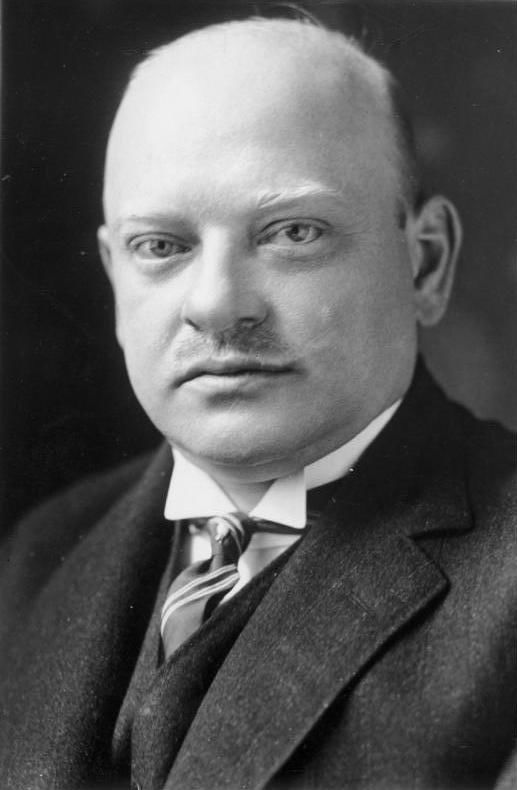
Gustav Stresemann- wrote his thesis on the Berlin Beer Industry .
Attribution: Bundesarchiv, Bild 146-1989-040-27 / Unknown / CC-BY-SA 3.0
The delegation also included Friedrich Wilhelm Otto Gaus the long-time head of the legal department of the Foreign Office Having studied law at the Universities of Geneva, Munich ,Berlin and Heidelberg, Gaus joined the Foreign Office in Berlin's Wilhelmstrasse in 1907. After postings as a diplomat to Genoa and Constantinople from 1910 to 1912, he mainly worked at Wilhelmstrasse. In 1919 he headed the legal commission of the peace delegation in Versailles. Afterwards he was employed in the peace and then in the legal department. As head of the department for international law, from 1923, he served under a number of German Foreign Ministers. .
Also on the German delegation, was Carl Von Schubert, the son of a Prussian general, entered the foreign service of the Reich in 1906. Among other things, he worked as a legation counsellor at the German Embassy in Bern, where he was involved in the “smuggling “ of Lenin's to Russia in a sealed train. In the Weimar Republic, Schubert, served as ministerial director from 1921, initially headed the England-America department in the Foreign Office, where he faced some hostility as a perceived Anglophile". In 1924 Schubert was finally selected as his state secretary by Gustav Stresemann. remaining one of his closest confidants until his death in 1929. The Esplanade is about 20 minutes’ walk downhill into the tow centre.
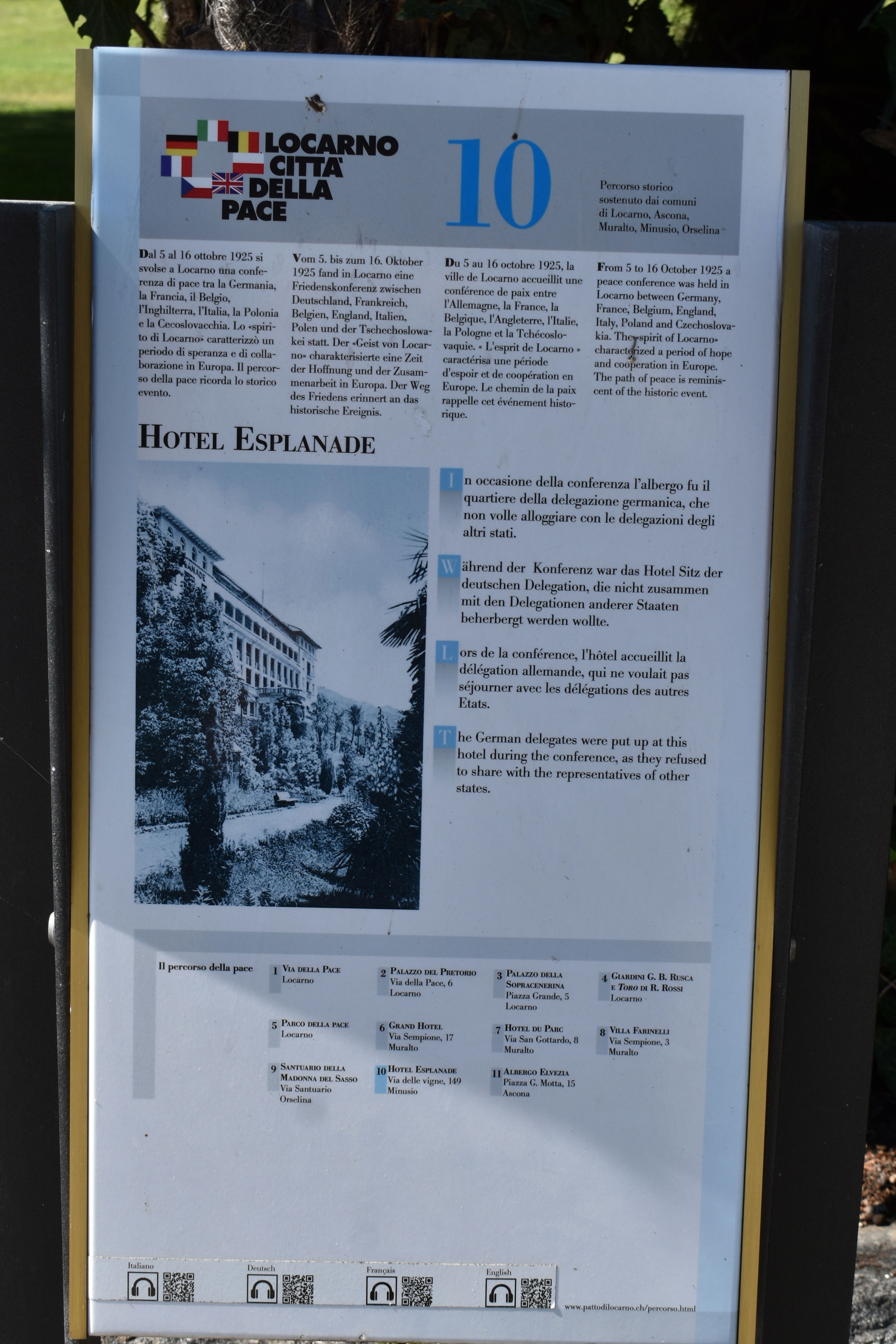
"The end of the Locarno Peace Trail - Hotel Esplanade
On the way down you pass another site on the peace trail, the location of the former Hotel du Parc, which was where the International Press Corps were based during, the negotiations. The Hotel du Parc has now been demolished and replaced by a “Tertarium “ – which Is I think another way of saying retirement home. It seems that the world’s press were conveniently located halfway between the German delegation and the Allied delegations in the town centre . Also, presumably within stumbling distance of the town centre hostelries.
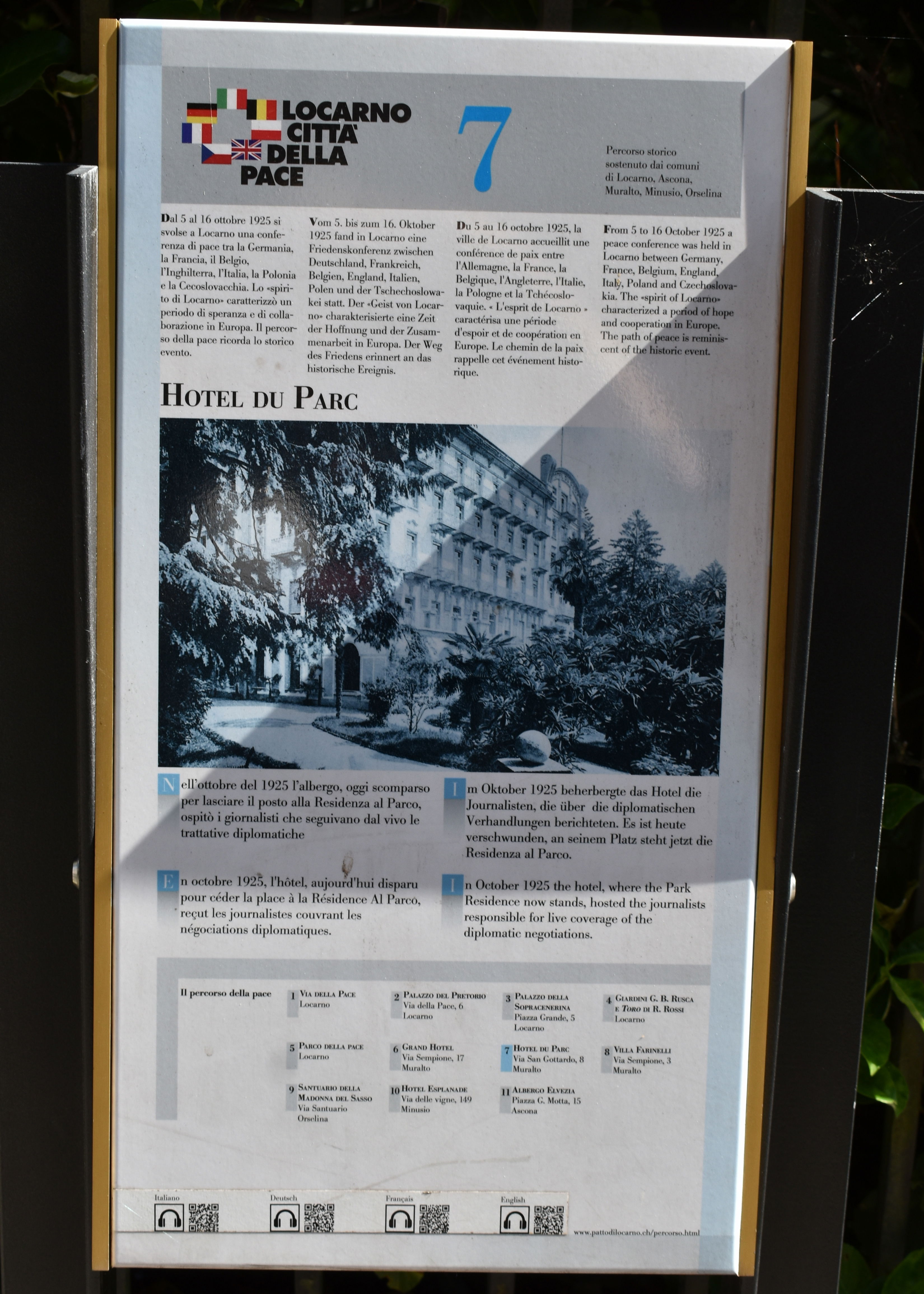
"The World's press were based at the Hotel du Parc- now demolished to make way for another retirement home"
Continuing downhill and just above the station you get to the Villa Farinelli. This was the former Italian Consulate. Italian Prime Minister, Benito Mussolini chose to stay here during is brief two-day visit at the end of the conference, while the rest of the Italian delegation stayed in the Grand Hotel. Possibly Mussolini was staying there to avoid the Belgian Prime Minister , with whom he was not on speaking terms. Switzerland was not unknown to Mussolini, who between 1902 and 1903 had worked as a laborer in various Swiss cities, to remove himself from conscription into the Italian Army. So much for all his later militaristic bluster, he started off as a “draft -dodger” , although he did later join in the First World War. Mussolini was at the time under a cloud for his involvement of the Italian opposition politician Giacomo Matteotti, From 1921 Matteotti had denounced fascist violence in a pamphlet titled Inchiesta socialista sulle gesta dei fascisti in Italia . In 1924 his book The Fascisti Exposed: A Year of Fascist Domination was published and he made two impassioned and lengthy speeches in the Chamber of Deputies denouncing Fascism and declaring that the last election, marked by intimidation and militia violence, was "invalid" Matteotti also publicly condemned the alliance of the socialist trade unions and the fascist counterpart, he may also have found evidence of bribes from Sinclair Oil n favour of Mussolini’s brother , in order to get permission for the petroleum exploitation. On 10 June 1924 Matteotti was bundled into a Lancia Lambda and stabbed several times with a carpenter's file as he was struggling to escape. His corpse was found after an extensive search near Riano ( 23 km north of Rome), on 16 August 1924. Five men were arrested a few days after the kidnapping. Whether Mussolini gave a direct order or whether it was more a question of the murderers currying favour with Mussolini, by ridding him of “ a turbulent priest”, remains not proven beyond doubt. Anyway, as a result, Mussolini was extremely unpopular among the socialist parties of France and Belgium and preferred not to leave Italy at the time. The Belgian Vandervelde ostentatiously refused to speak to or to shake Mussolini’s hand Although , Mussolini did receive a warm reception on this occasion, but it proved to be his last visit to Switzerland. The Italian speaking Canton of Ticino, later becoming a refuge for those fleeing the excesses of his regime. Some would say that Mussolini was on his way there, when he fled Milan in April 1945-although the Swiss probably would not have let him in.
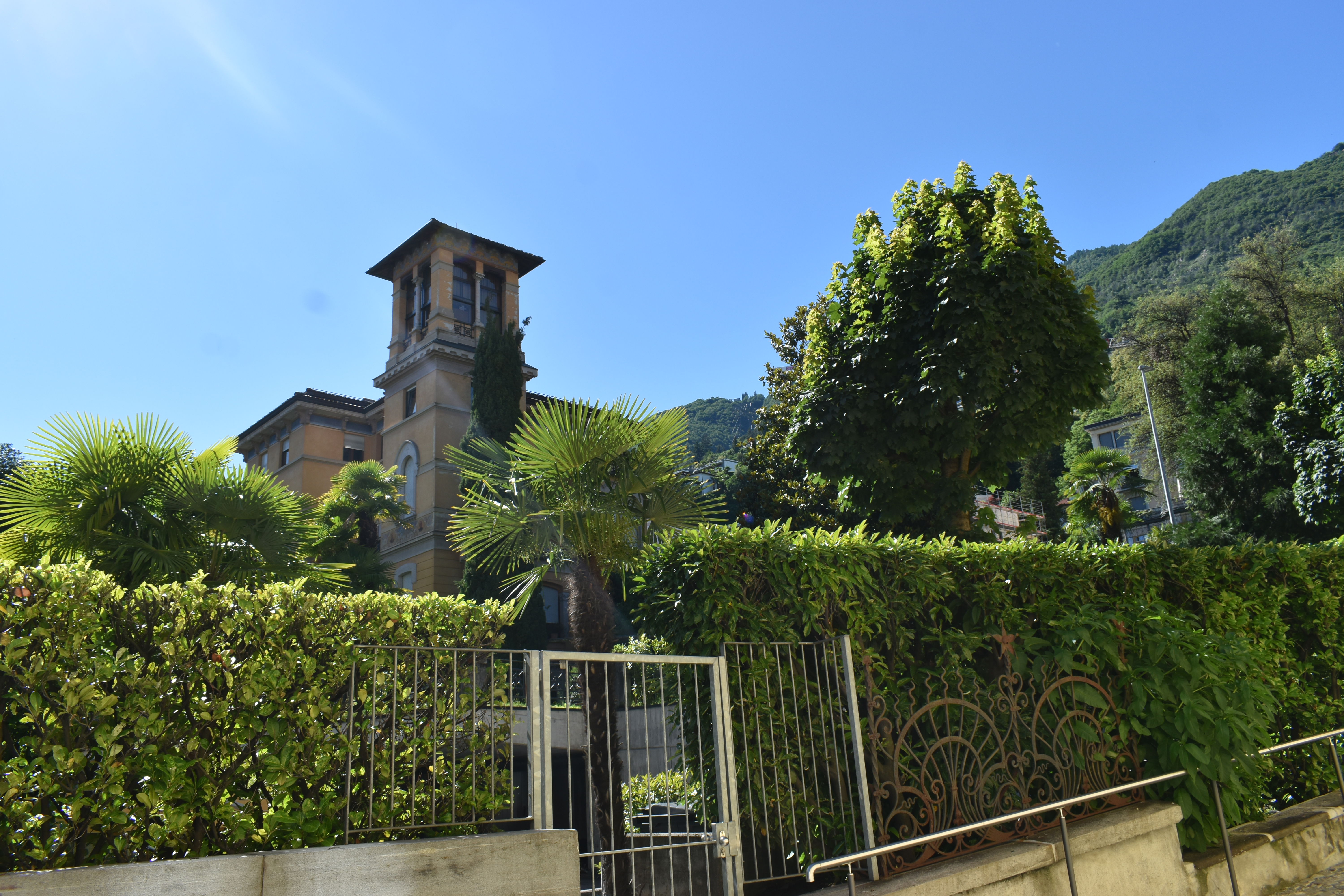
Villa Farinelli - where Mussolini stayed away from the rest of the delegates
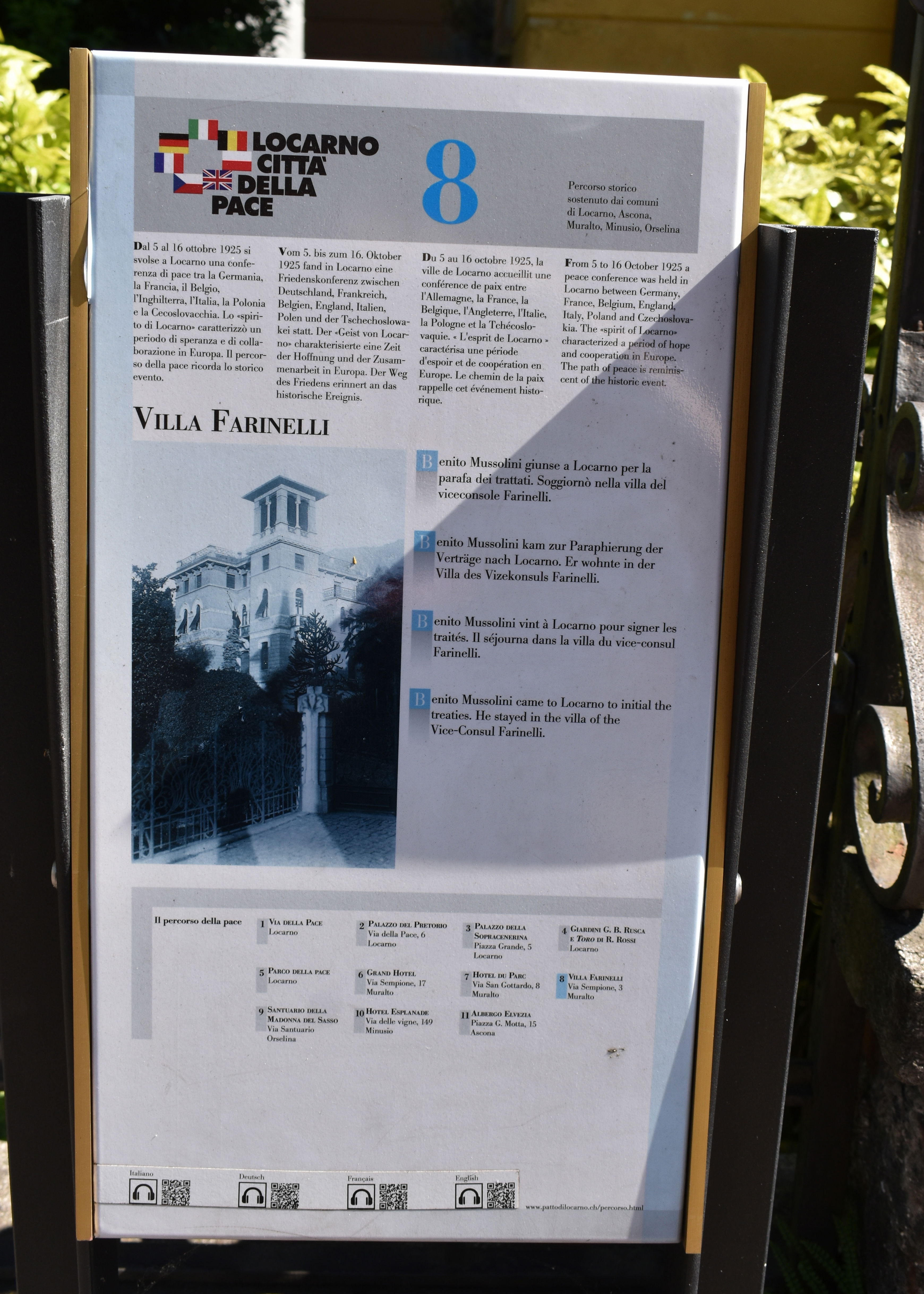
"Continuing on the Peace Trail"
Further on from the Villa Farinelli and staying above the station, we come to the Albergo Grand Hotel and very Grand it must have been, although these days it is no longer a hotel and in a very sorry state.
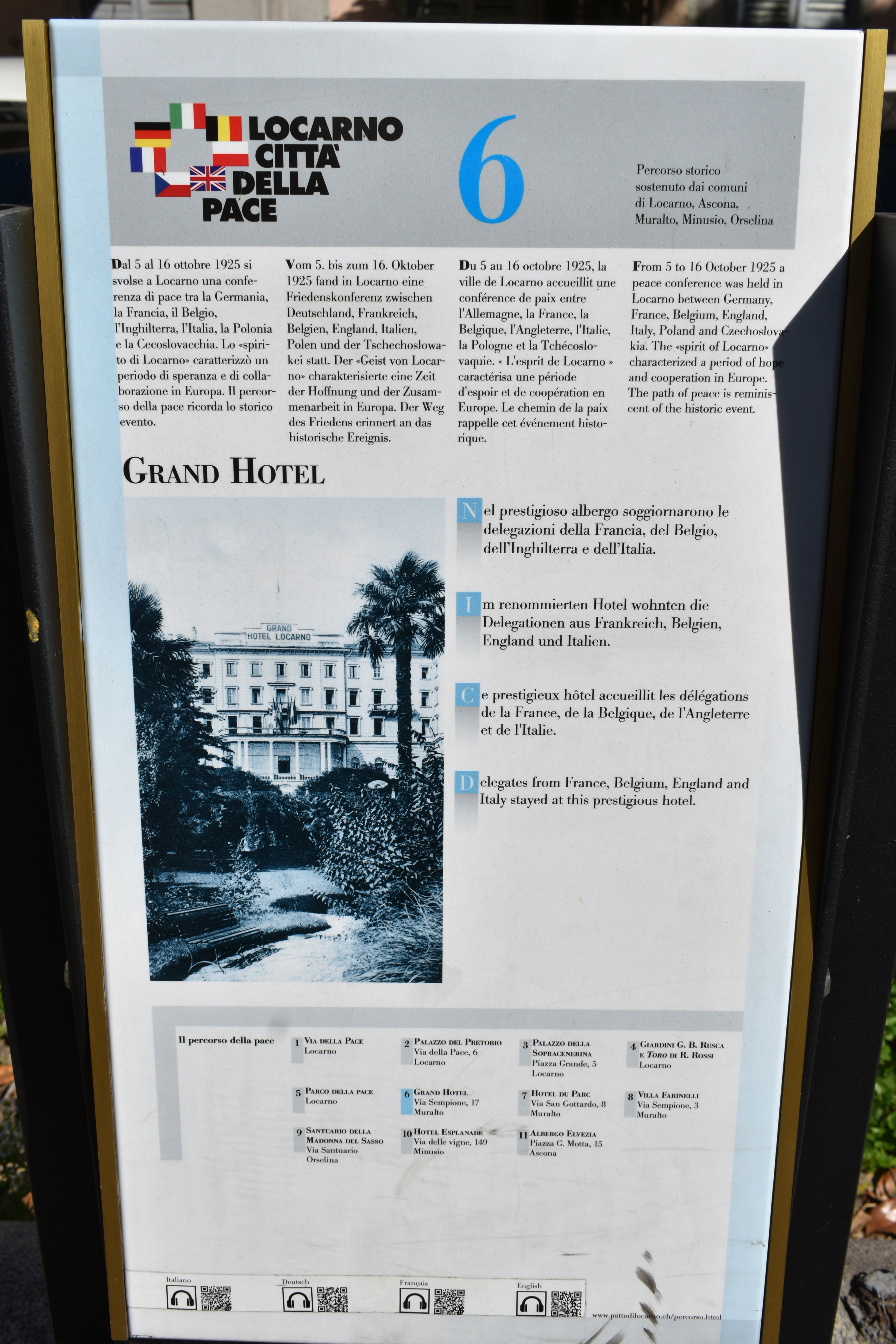
"No longer Grand Hotel"
Although still imposing from the outside it is largely boarded up and in the process of a stalled restoration project. Maybe it will end up as another retirement home. As a sign of the times, the entry to the Hotel from the lakeside is now occupied by a McDonalds, and what must have been some rather pleasant gardens are in a state of dilapidation o what the Italians might call “restauro”. Anyway, it would be good to see this bit of history preserved as a memory of “The Spirit of Locarno”, maybe a centre for Peace or Conflict Studies might be more appropriate. The Grand Hotel as where most of the Locarno action took place. If somebody wanted a private chat with the German delegation, the word telegraph the Hotel Esplanade and the German delegation would pile down the hill in their car to oblige.
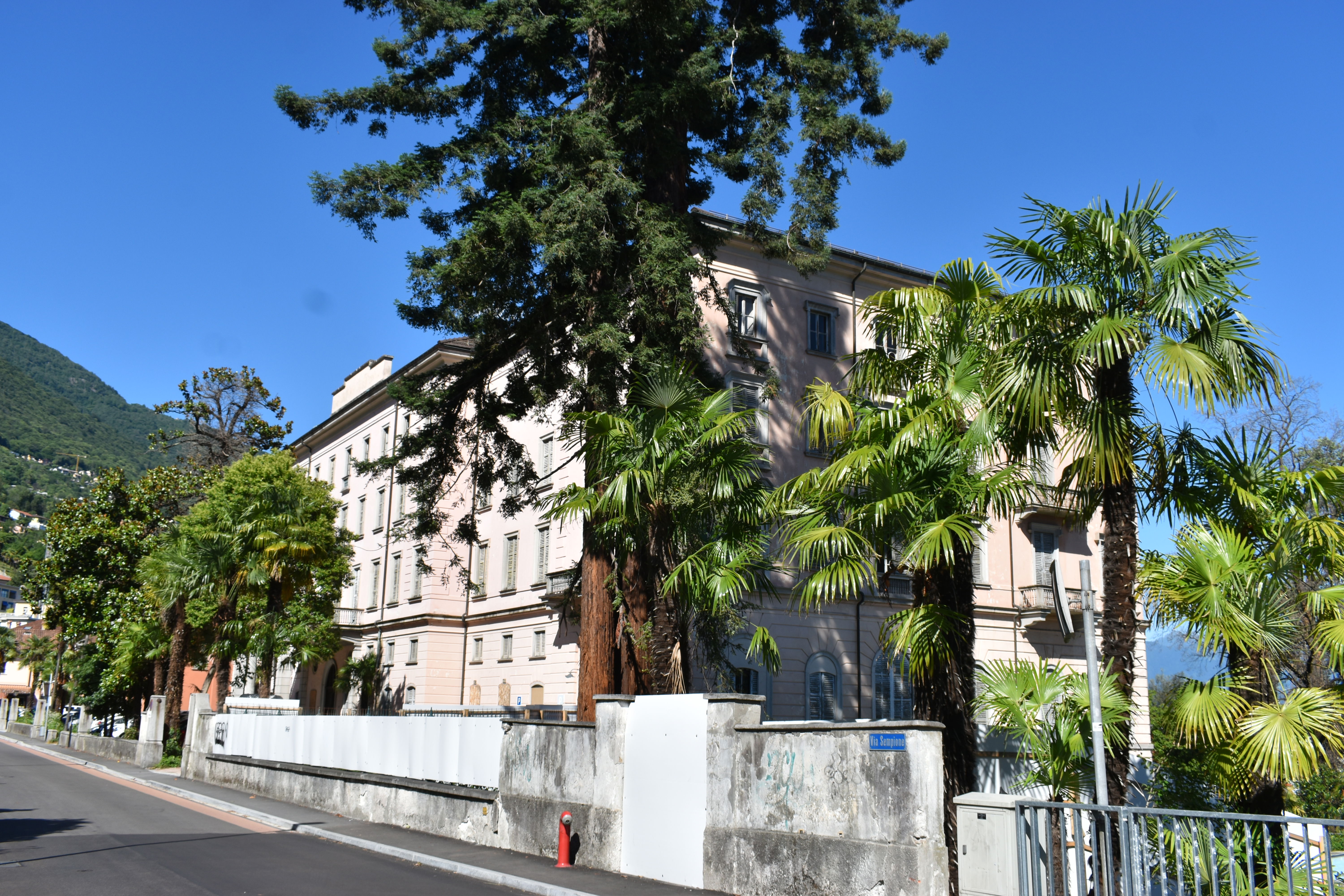
The British delegation were based at the Grand Hotel. Led by a competent and extremely well-turned-out Foreign Secretary in the person of Austen Chamberlain. A Foreign Secretary who acted and indeed dressed the part. Austen Chamberlain was born in Birmingham, the eldest son of Joseph Chamberlain, a rising industrialist and political radical, who became Mayor of Birmingham, .His mother died giving birth to Austen, and In 1868, his father married his late wife’s cousin, Florence, and had further children, the oldest of whom, Neville, would become Prime Minister . Austen was educated Rugby before passing on to Trinity College, Cambridge. It would seem that from an early age his father had intended for politics to be Austen's future path, and with that in mind, he was sent first to France, where he studied at the Paris Institute of Political Studies , developing a lasting admiration for the French people and culture. Austen was then sent to Berlin for twelve months, to imbibe the political culture of Germany. Austen met and dined with the "Iron Chancellor", Otto von Bismarck, an experience that was to hold a special place in his heart for the duration of his life, however he developed a suspicion of the growing nationalism in Germany. Austen returned to England in 1888, lured largely by the prize of a parliamentary constituency. He was first elected to parliament as a member of his father's Liberal Unionist Party. Owing to the prominence of his father and the alliance between the anti-Home Rule Liberal Unionists and Conservatives,
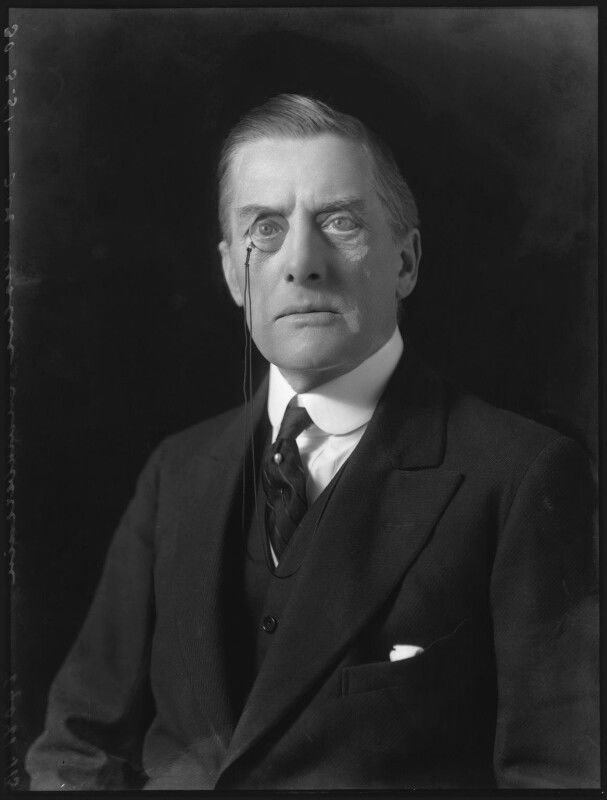
"Austen Chamberlain- a proper and well turned out Foreign Secretary"
Chamberlain was returned unopposed on 30 March 1892. Chamberlain was accompanied by a high-powered team of experts. His Principal Private Secretary , Walford Selby was a career diplomat who had served before the war in in Berlin and the Hague, as well as taking time out to organize George V’s Coronation. He had gone onto be Private Secretary to the British Foreign secretary Sir Edward Grey,. Before being released by the foreign office to serve in the Grenadier Guards at the tail end of the War. With the war over , Selby had returned to diplomacy as First Secretary of the High Commission in Cairo.
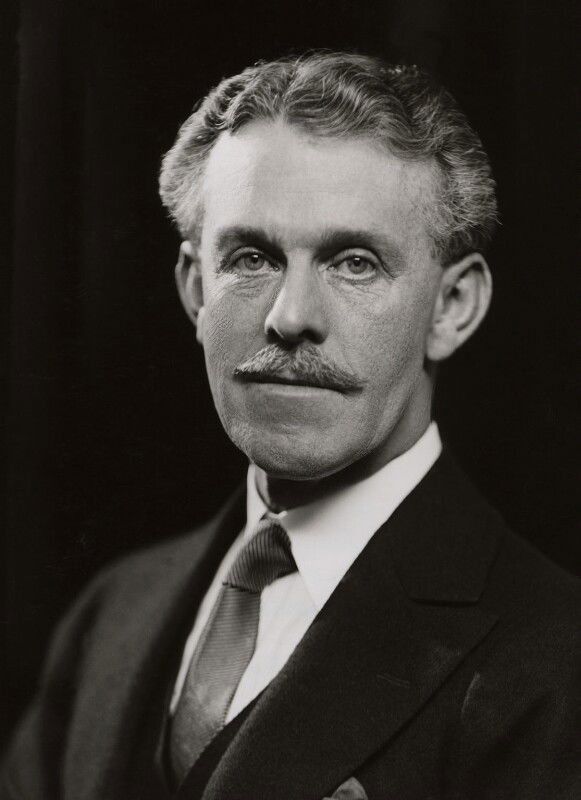
"Walford Selby -British diplomat, who later had a bit of bother with the Duke of Windsor"
Legal adviser to the British delegation was Cecil Hurst, Hurst was a delegate of Great Britain at the Hague Convention in 1907, and one year later with London Naval Conference, at which maritime law was crafted. After the end of the First World War he attended the Paris Peace Conference, 1919. The British Team was completed by Miles Lampson and Sterndale Bennett from the Central Europe Department of the Foreign Office. Doubtless there were quite a few Under- secretaries, bag carriers and so on.
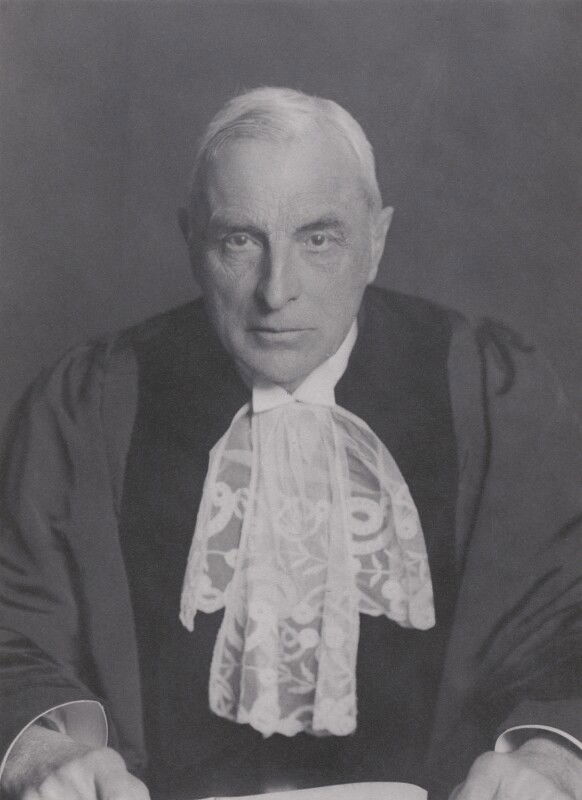
"Distinguished jurist Cecil Hurst"
When the British delegation had left Victoria Station on 3 October for the boat and train trip to the continent, Chamberlain made the sardonic remark,
“Wish me well but don’t expect too much”
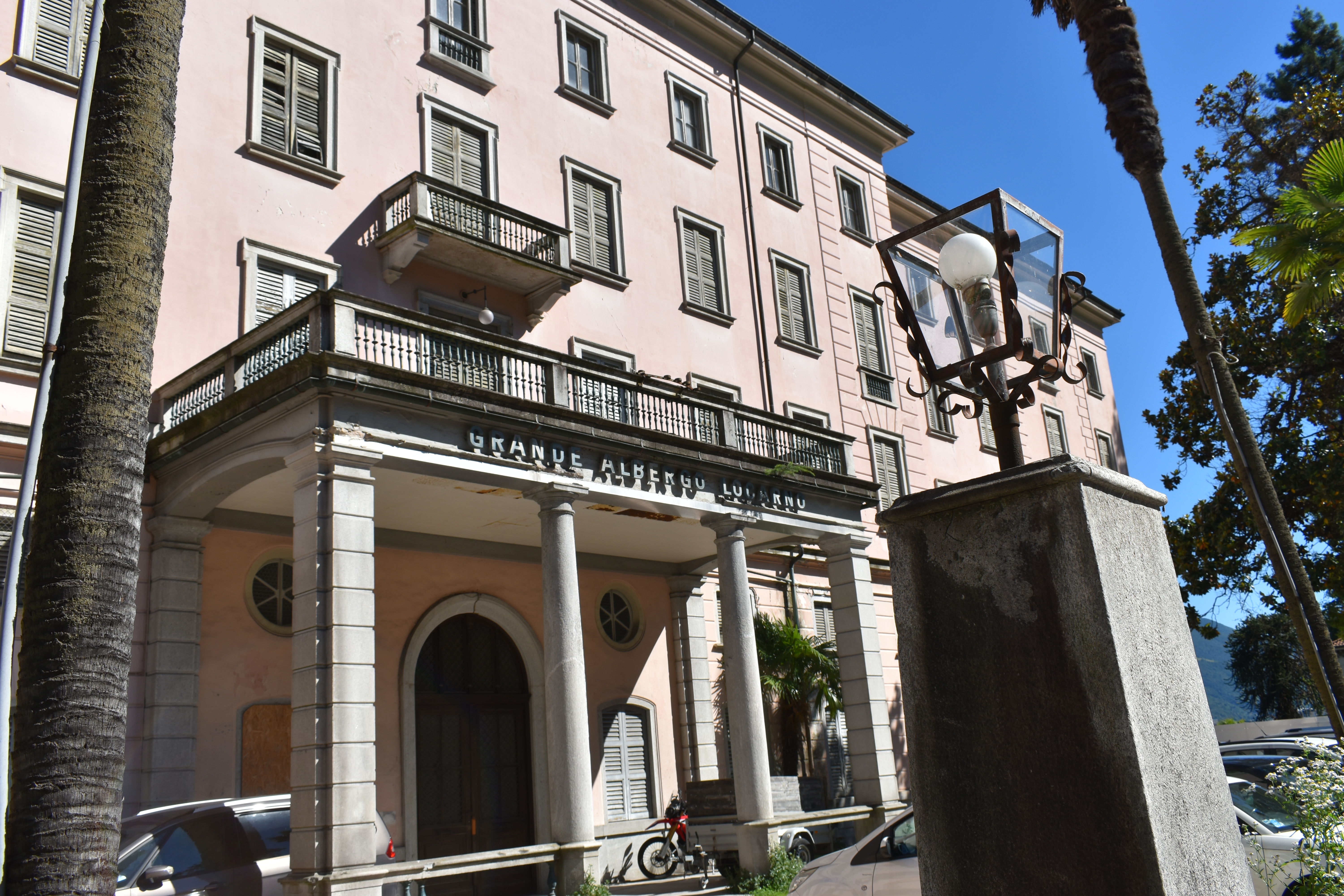
Also staying at the Grand Hotel were the French delegation led by Aristide Briand. Briand had been Prime Minister of France no less than seven times, in the ever-changing French Governments of the Third Republic. Born in Brittany, Briand’s heritage containing something of the peasant, something of the aristocrat, and a good deal of the Breton. His father, a prosperous innkeeper, sent him to school in Saint-Nazaire and then to the Nantes Lycée. There he was friends with the author Jules Verne, In A Long Vacation, a novel for youngsters, Verne describes a thirteen-year-old boy named «» Briant, he says, was audacious, quick at repartee, a good chap, somewhat untidy, « intelligent but so unwilling to waste good time studying that he was usually in the last quarter of his form. Throughout his life Briand read little but listened intently, never prepared a speech but was, by common acknowledgment, the leading French orator of his generation; he understood everything, so it was said, but knew nothing. Although Briand studied law and established a practice, he preferred the profession of journalism to that of law. He wrote for various newspapers and collaborâted with Jean Jean Jaurès in founding L’Humanité, . A supporter of the labour-unions.
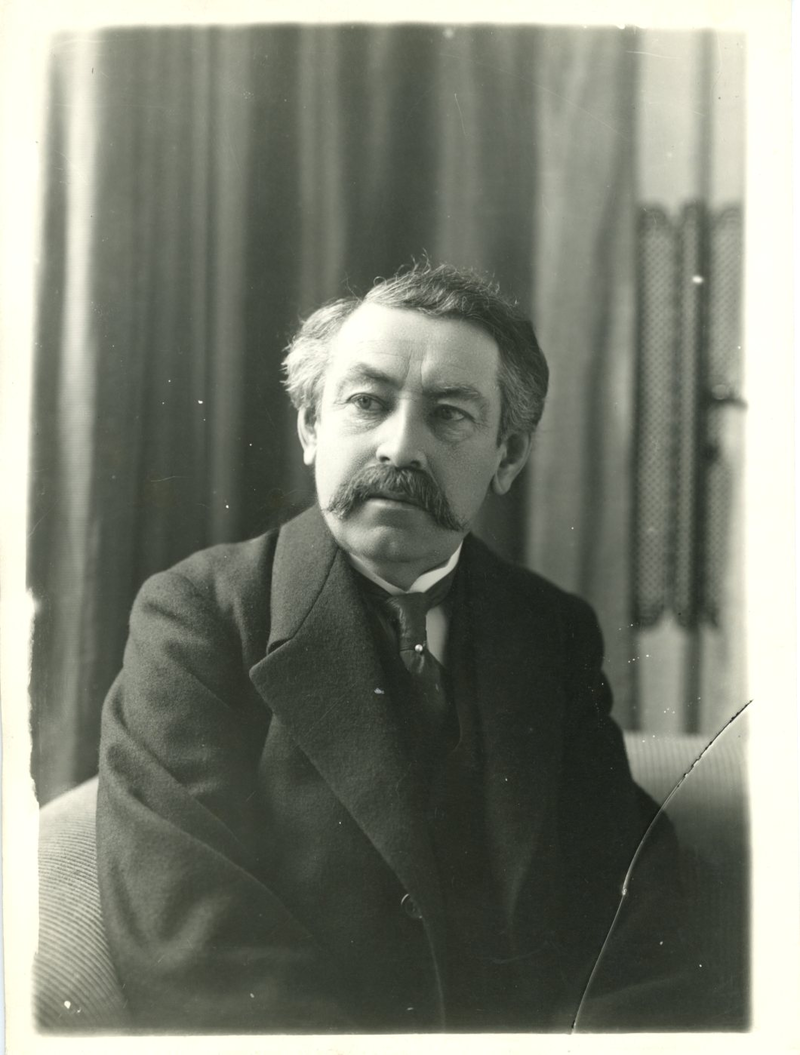
Aristide Briand
Briand emerged as a leader in the French Socialist Party after a speech at a congress of workingmen at Nantes in 1894. He found his true calling in politics, however, when, at the age of forty, he was elected to the Chamber of Deputies in 1902. Briand, the enemy of war, was forced by the irony of events to lead his nation during World War I for eighteen critical months from October 1915, to March, 1917. He devised and, despite opposition from the French general staff, resolutely supported a plan, ultimately a successful military venture, to strike Turkey, Bulgaria, and Austria through Greece; he strengthened the French high command; he helped to obtain a new ally in Italy. Fortunately for his relations with the Germans, Briand was out of office by the time the French enforce the provisions of the Treaty of Versailles on a defeated Germany. In April 1925, he was recalled as the French Foreign minister.
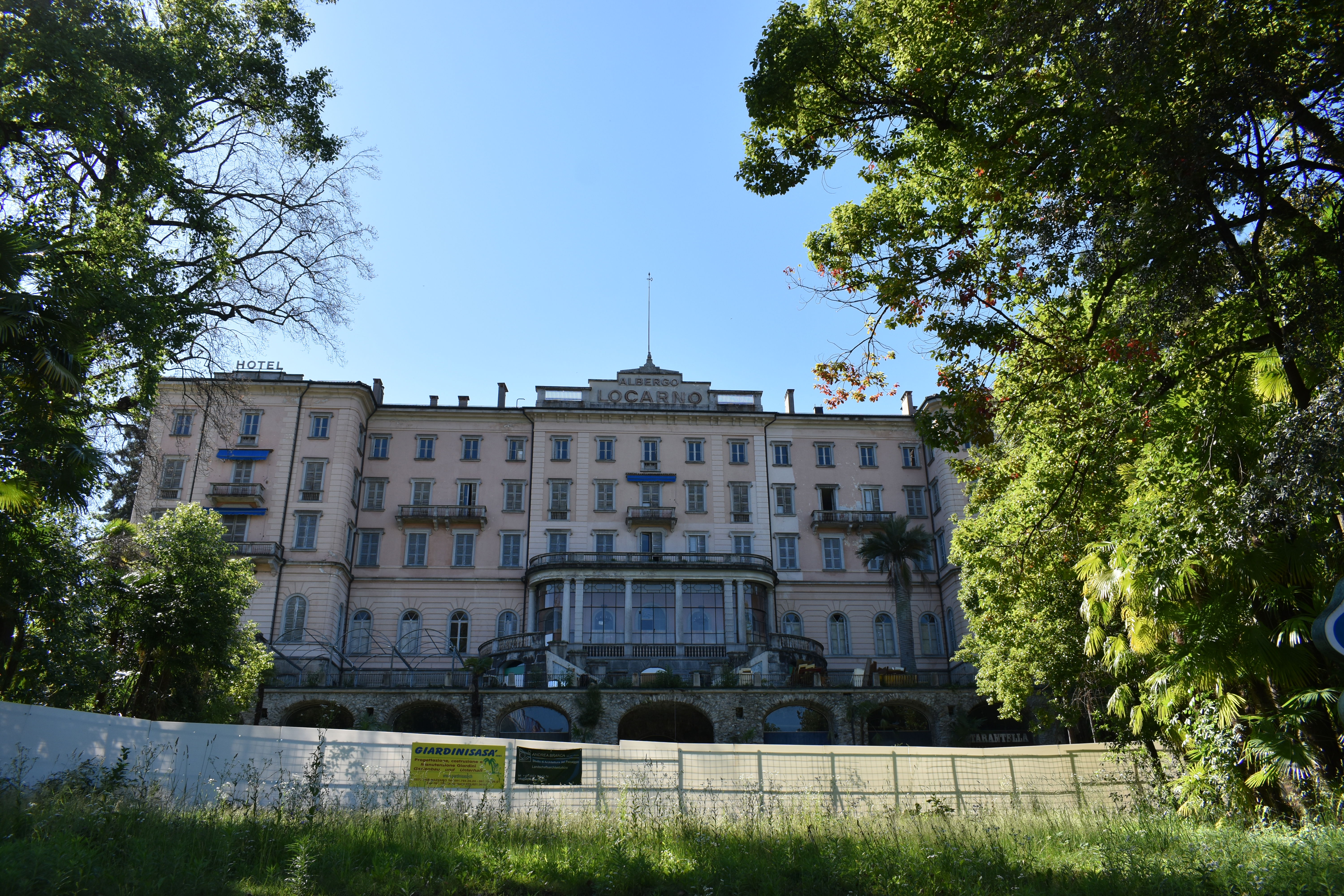
"The stalled renovations at the Grand Hotel"
The Belgians were represented by Emile Auguste Vandervelde . Born into a middle-class family in Ixelles, a suburb of Brussels, in 1866, Vandervelde entered the Free University of Brussels as a law student in 1881.He soon became interested in emerging socialist ideas and, in 1885, joined the small Ligue Ouvrière d'Ixelles) and then the newly formed Belgian Labour Party (POB–BWP). Following the extension of universal male suffrage in 1893, Vandervelde proposed a manifesto for the POB, known as the Charter of Quaregnon In the 1894 elections, Vandervelde was elected to the Chamber of Representatives for the industrial city of Charleroi. He held the seat until 1890, when he transferred to Brussels. He was a staunch opponent of Leopold II and the absolute power he enjoyed in the Congo during the 1890s and wrote numerous articles against capitalist colonialism. From 1900 to 1918, he held the position of president of the Second International. Vandervelde was named Minister of State in 1914 and supported the policy of resistance to the German invasion of Belgium in World War I. As one of the more respected Socialists within Europe, he encouraged other socialists and other parties on the left to support the war against Germany. He was a delegate for Belgium at the Treaty of Versailles and subsequently involved in the League of Nations. Vandervelde held the portfolio of Minister of Justice between 1918 and 1921 in which role he supported prison reform, measures against alcoholism, trade union rights and women's rights. rom 1925 to 1927, he held the role of Minister of Foreign Affairs
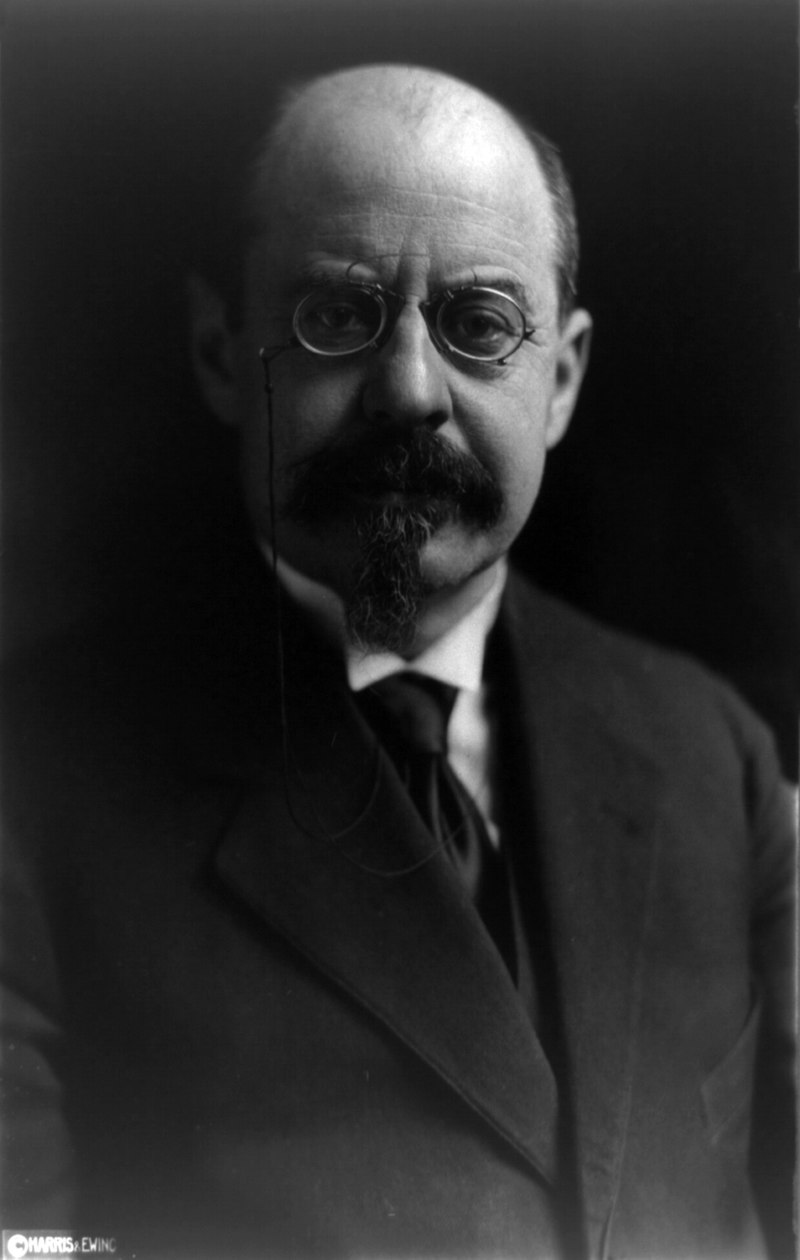
"Emile Auguste Vandervelde - avoided Mussolini like the plague"
Also staying at the Grand Hotel were the Italian Delegation, headed by the eminent Jurist and Senator Vittorio Scailoja. In the delegation was Fascist Under Secretary of State at the ministry of Foreign Affairs, Dino Grandi. Born at Mordano, province of Bologna, Grandi was a graduate in law and economics from the University of Bologna. After serving in World War I. Grandi practised as a career as a lawyer in Imola. Although originally attracted to the political left, he nonetheless became impressed with Mussolini after the two met in 1914, and became a staunch advocate of Italy's entry into the World War. Grandi joined the Blackshirts at age 25, and was one of 35 Fascist delegates elected, along with Mussolini, in May 1921 to the Chamber of Deputies. Grandi survived an ambush carried out by leftist militants in 1920, and had his studio devastated on one occasion. After the March on Rome on 28 October 1922, , Grandi became part of the new government; first as the undersecretary of the interior (1923), then as the Italian Minister of Foreign Affairs
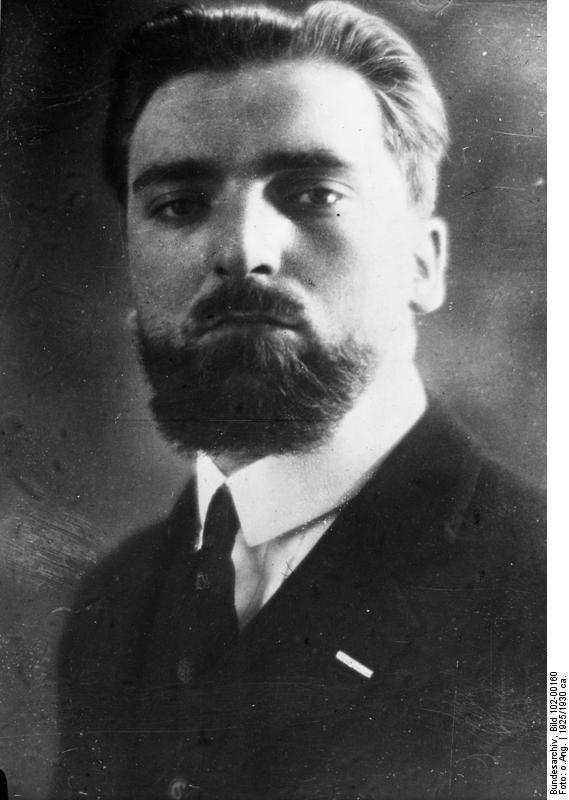
"Dino Grandi - early Fascist who later turned on Mussolini"
Chamberlain was less fastidious about continuing to deal with Mussolini . He had already met with Mussolini in Rome ( the first of a series five private meetings) . The first time was on 7th December 1924, only six moths after Matteotti’s murder, than the Belgians. Chamberlain and Mussolini conversed in French, without any aides or interpreters present. Foreign Office officials had not seen Mussolini’s presence at Locarno as being vital; Mussolini made the last-minute decision to head for Locarno, which he communicated the British Ambassador Rome only on the 14th October. He left Rome that night by train from Rome to Milan, and then by train and car to the Italian City of Stresa, from where he was conveyed d across Lago Maggiore in a speedboat. Ne met with Chamberlain almost immediately on his arrival in the afternoon. Chamberlain’s notes were that they discussed the Pact, followed by various Balkan issues. There is no record of Italian interest in Albania being discussed. Any way Mussolini was around for the signing and the official photographs the following day and then went back to Italy, As the British historian David Dutton puts it
“He came. He signed. He postured”
If Chamberlain wanted to make Mussolini feel loved and wanted and Italy , a major power – getting him involved at Locarno apparently did the trick .
Poland was represented by Aleksander Skrzyński, The forty three year old Skrzyński had entered the Austro- Hungarian diplomatic service in 1906 and, when the new Polish state was established, was appointed Polish minister plenipotentiary at Bucharest. In December 1922, after the murder of Gabriel Narutowicz, the first president of the republic, Skrzyński became minister of foreign affairs. When a cabinet of the right was formed in May 1923, Skrzyński lost office, but by August 1924 he again became minister of foreign affairs.
By 10 October, articles 6 & 7 still had to be agreed. Briand thought that private conversation would be more effective, than a full conference session. Although both he and chamberlain wanted the legal advisers present to prevent any misinterpretations. It was Vandervelde who suggested a small group and Briand proposed an excursion on the Lake that same afternoon. Seemingly, the excuse given was Mrs Chamberlain’s birthday . The boat the M/N Fiori d’Arancio left Locarno at 2.45 and headed for the Italian side of the Lake, where the motorboats full of journalists were turned back.- In the drawing room, a semi-circular gaming table had been set out, covered with green cloth . Apparently present were Chamberlain , Luther, Stresemann , Briand , Fromageot , Gaus , Hesnard ( Briand’s interpreter ) and Cecil Hurst
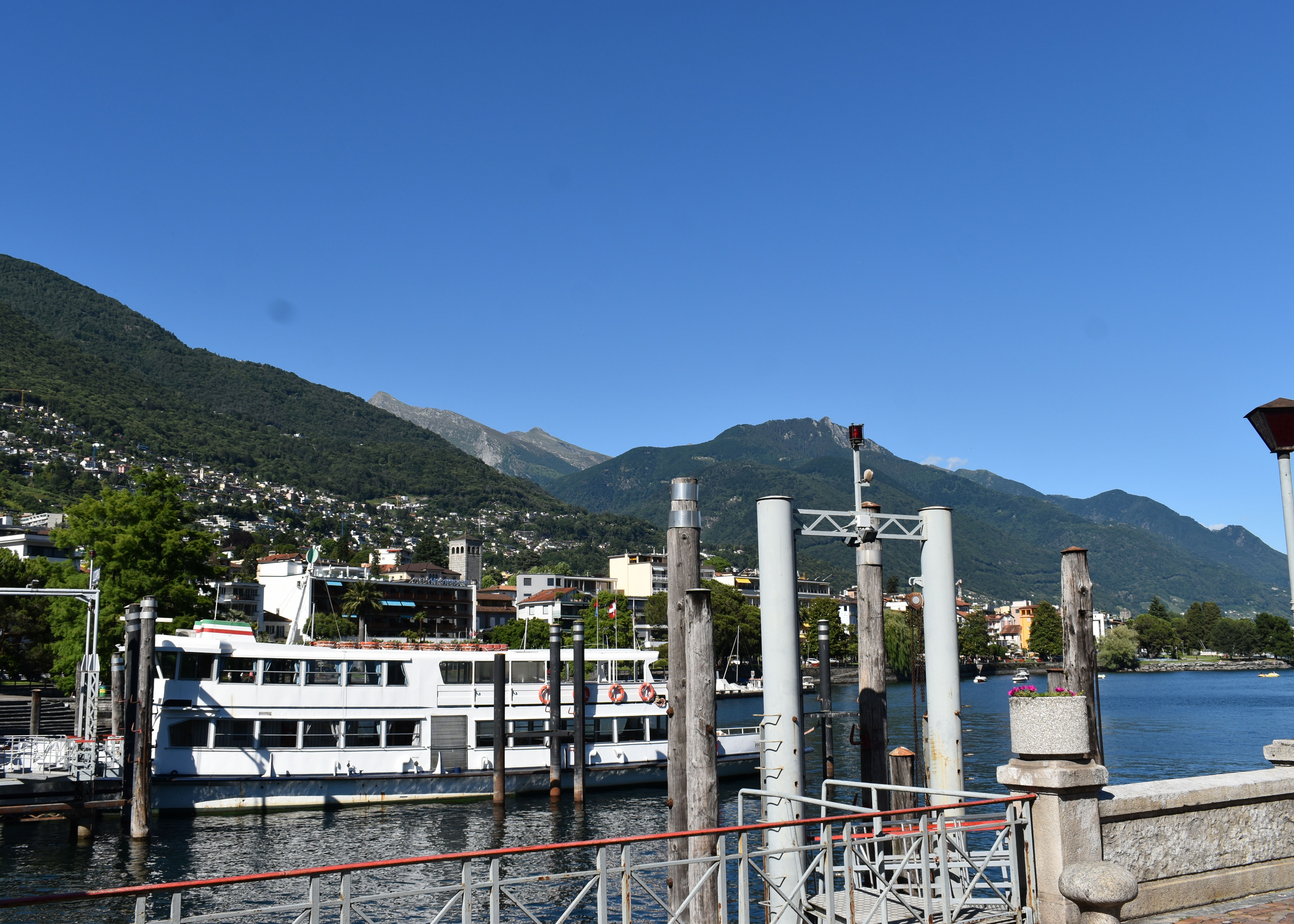
"The Locarno Boat Dock- from where the delegates set out on Mrs Chamberlain's bithday cruiiise on the M/N Fiori d'Arancio and came back wiith the Texte Bateau"
Heading into the Center of town near the lakeside, you find the Palazzo del Preterio where The Treaties were initialled on 16 October 1925. Coincidentally, it was Austen Chamberlain’s birthday. The formal signatures were done at London on 1 December 1925, in what is now known as the Locarno suite in the Foreign Office.
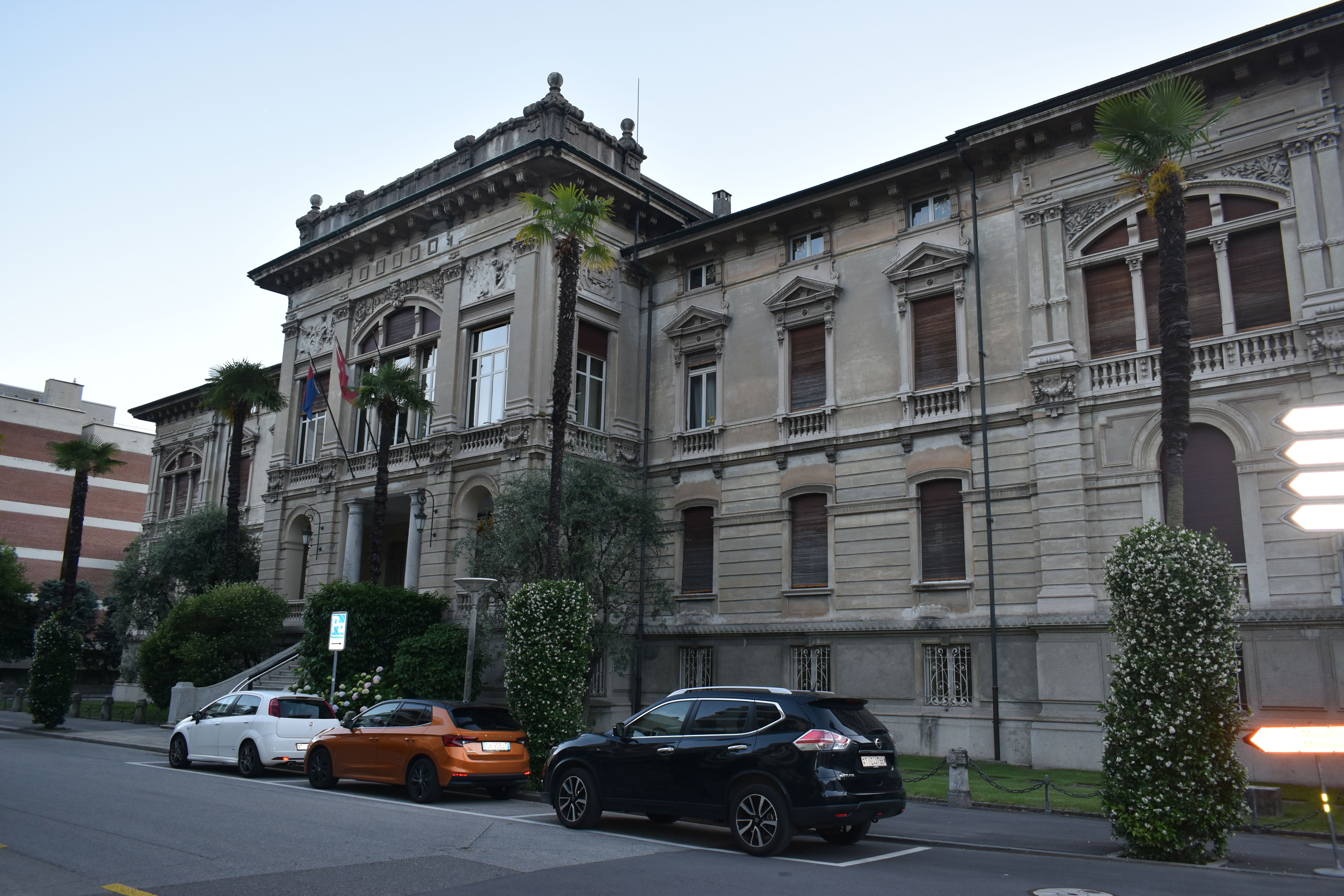
Palazzo del Preterio
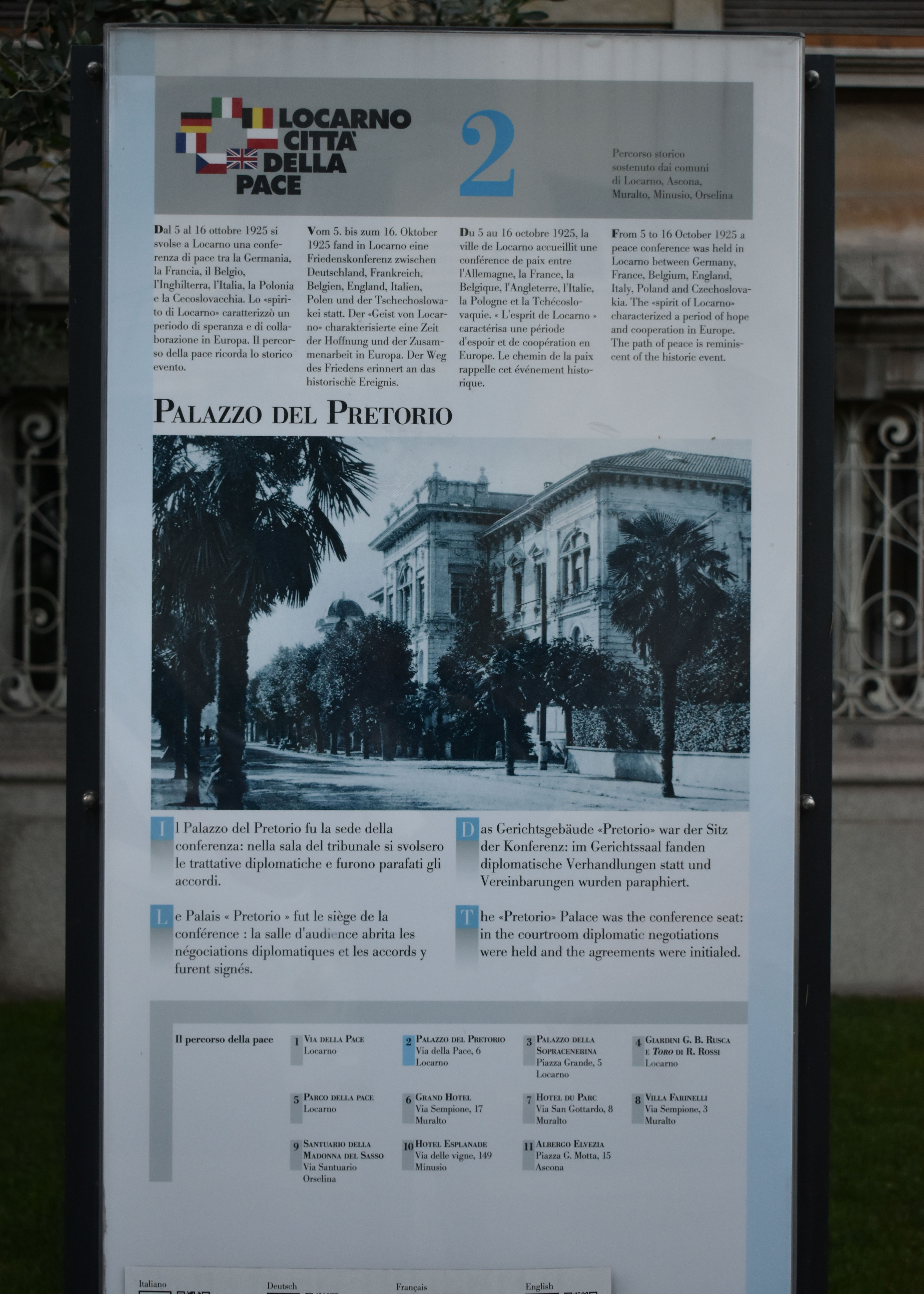
As Chamberlain said at the time, Locarno was the beginning of a process. However, many people regarded it as the ‘beginning of the great peace’. The atmosphere of the conference was one of hope. Chamberlain, with his characteristic loyalty, remained favourably disposed towards the people present, including Mussolini, for the rest of his life. He emphasised strongly that the good will shown at the conference was evidence of the wish for peace.
The citizens of Locarno celebrated by illuminating
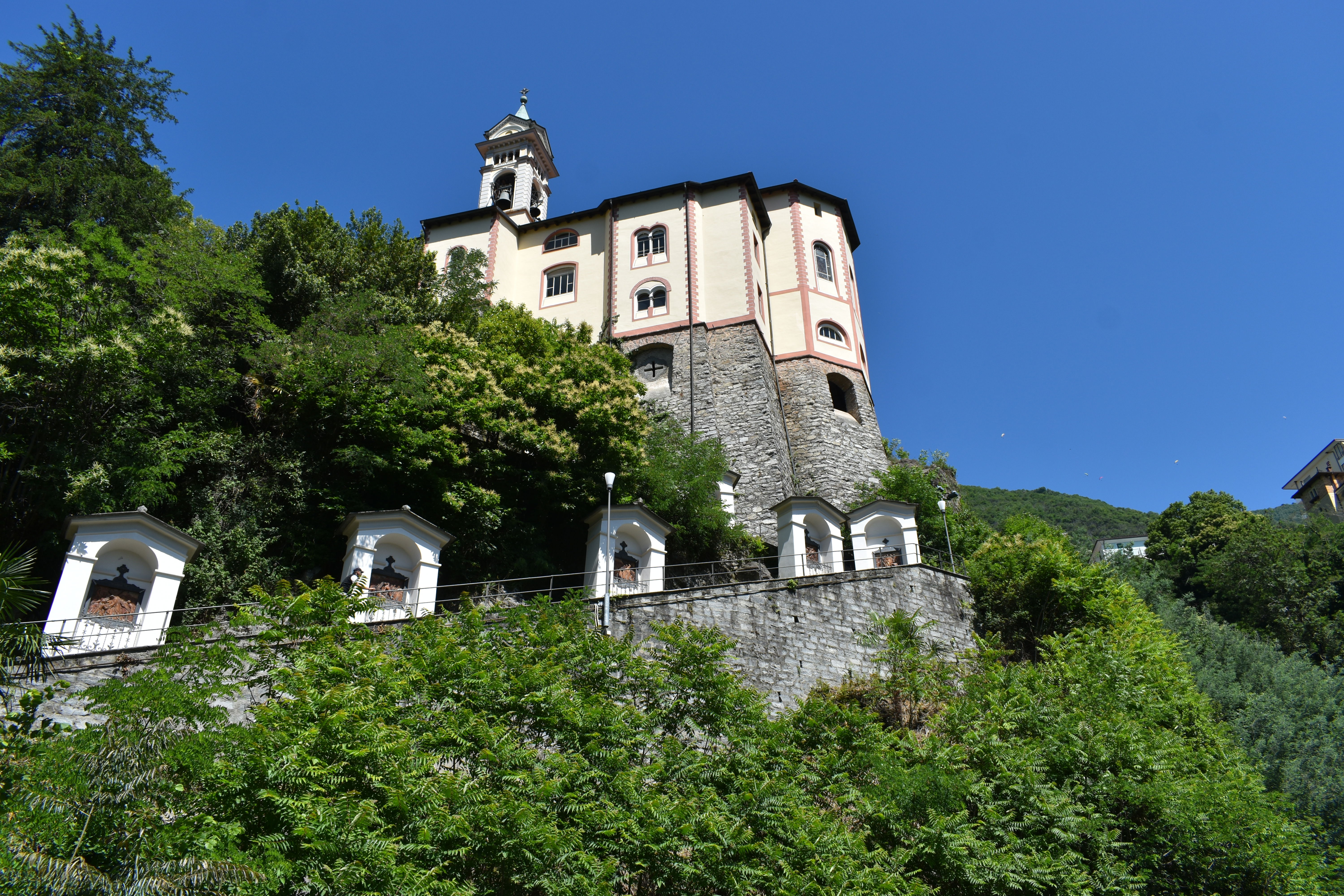
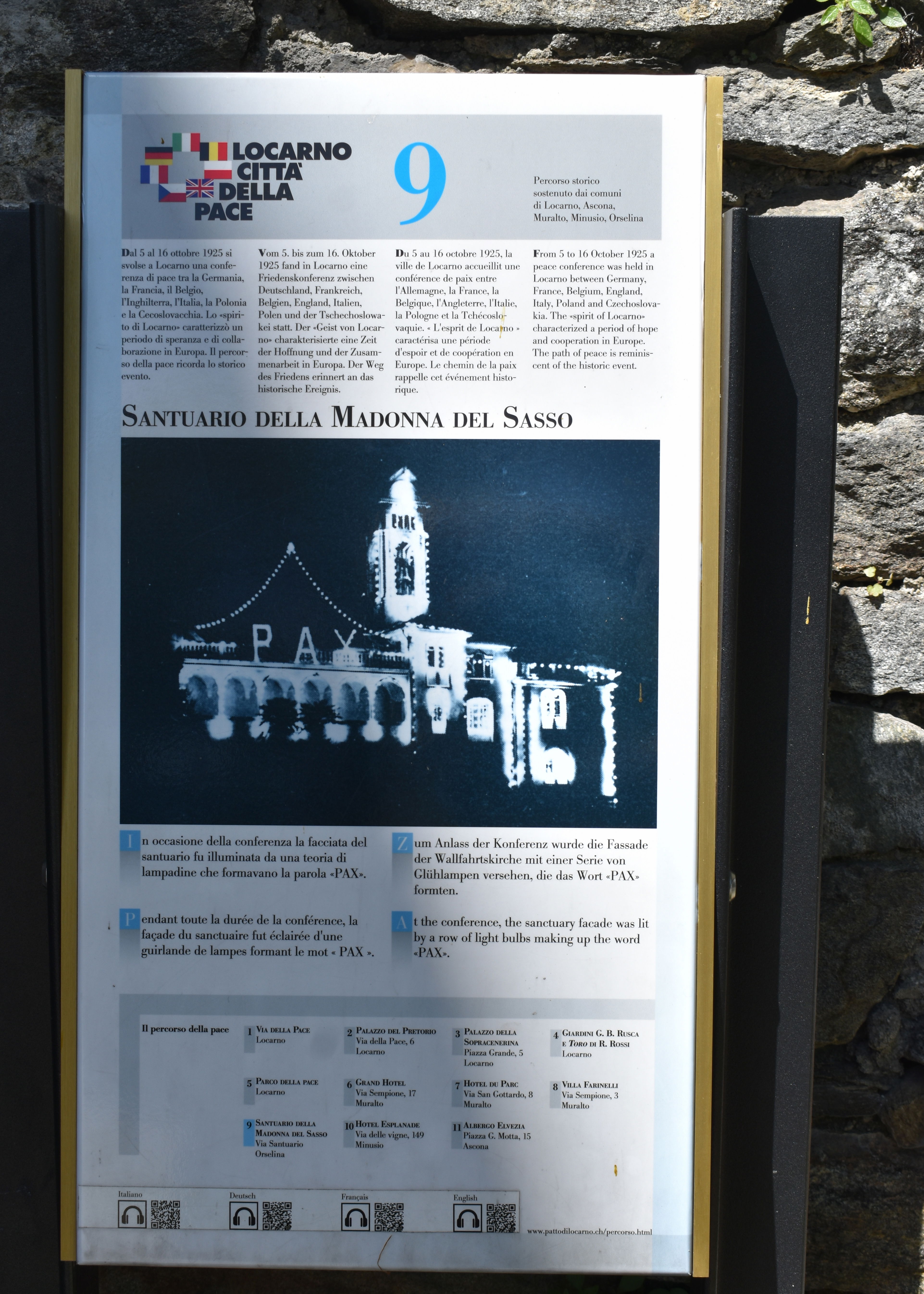
Chamberlain was pleased with the generous praise following Locarno but began to see himself as the only person in government able to resolve international disputes with diplomacy. This overconfidence later caused problems, such as when he agreed a disarmament treaty with France in 1928 and announced it in Parliament without agreeing the principle with the Cabinet. The agreement was highly preferential to the French as Austen had let his friend, the French Foreign Minister Aristide Briand, amend it as he wished. However, the treaty was disliked by the Americans and Germans who regarded it as a semi-military agreement. In advocating Locarno, Chamberlain was not primarily concerned with German sensitivities, but with stability in western Europe. His relationship with the Germans was never good, despite his respect for Gustav Stresemann, the German Foreign Minister. This aversion had developed during a visit to Germany as far back as 1887, before he entered politics; he disliked the German character and was concerned that the Germans thought themselves superior. This meant that Austen Chamberlain was one of the first Britons to distrust Hitler. Although Locarno was considered a success at the time, later criticism pointed out that it did not deliver peace. Poland and Czechoslovakia were concerned that the lack of a mutual assurance treaty for their borders amounted to an invitation to invade. Chamberlain had not supported the inclusion of Germany’s eastern borders; it was, he said (adapting Bismarck’s famous phrase), something for which “no British government ever will or ever can risk the bones of a British Grenadier”.
Briand and Stresemann received the Nobel Peace Prize in 1926. Austen Chamberlain had previously received the award in 1925
For Austen Chamberlain , Locarno was the high point of his career, afterwards he ran into problems with policy on the Far East and Egypt, after the election of 1929, Chamberlain resigned his position as Foreign Secretary and went into retirement. He briefly returned to government in 1931 as First Lord of the Admiralty in Ramsay MacDonald's first National Government, but soon retired later that year after having been forced to deal with the unfortunate Invergordon Mutiny. For the next six years as a senior backbencher, he gave strong support to the National Government on domestic issues but was critical on foreign policy and was a prominent voice calling for British rearmament in the face of a growing threat from Germany. He died on 16 March 1937, ten weeks before his half-brother, Neville, became the first and only member of the Chamberlain dynasty to become Prime Minister.
Maybe Austen Chamberlain got rather too close to Mussolini. He continued to have private meetings with him , at Rapallo in December 1925, on a yacht in Livorno in September 1926 and a final meeting in castle in Florence in 1927. All the meetings were in person and without aides or notetakers. sorts of rumours abounded about what had and had not been discussed, leading to speculation that Chamberlain had acquiesced to the Italians intervening in Albania, while the Italians had promised the British assistance if trouble broke out with the Turks over Mosul. Maybe Chamberlain was just trying to be a good influencer and a pacifier. Following Austen’s death in 1937, Ivy Chamberlain, kept up the good work .-being used by brother-in-law Neville, as an unofficial contact with Mussolini.
Having organised George V's coronation, Sir Walford Selby ended up with a role in Edward VIII's Abdication Crisis. Following the abdication , The Duke of Windsor left the UK to hole up in Austria. It fell to Sir Walford, who was at the time British Ambassador in Vienna to greet the runaway King at Vienna Station. In 1940, Sir Walford was British Ambassador in Lisbon, when the Duke turned up there too on the run from the German invasion of France
Unfortunately for Germany, and probably everybody else the pragmatic Gustav Stresemann died of a stroke on 3 October 1929 at the age of 51. Luther voluntarily decided to resign after a Reichstag majority censured him on 12 May 1926. On 11 March 1930, Luther was appointed as president of the Reichsbank. To ensure his independence, he gave up all other offices and also left the DVP. Luther supported Heinrich Brüning's deflation policy out of loyalty and conviction. During the crisis in German banking in June/July 1931, he stretched the envelope—both legally and in terms of the Reichsbank's financial means—to help the banks repay the short-term loans called in by foreign creditors. Criticism by the banks including the demand for his resignation were without foundation and served mainly to hide the banks' responsibility for their own situation. On the evening of April 9, 1932 Hans Luther was shot at on the platform of the Potsdam station wounded in the shoulder. The assailants had written a letter before in which they criticized Luther's monetary policy. After the Nazis seized power in 1933, Luther acceded to a demand by Hitler and resigned his post on 16 March 1933. He was, however, offered the post of German ambassador to Washington. In 1937, he retired from active public service and in 1942 retired fully. Luther returned to serve post war Germany in different capacities, He died in Düsseldorf on 11 May 1962
Gaus was more compromised by the Nazis, despite his marriage to a quarter Jew, Gaus was valued as a legal expert on contractual matters and international relations and was entrusted with the preparation of numerous political and legal documents and contracts. He was a member of the National Socialist Academy for German Law founded by the notorious Hans Frank and wrote the German-Polish non-aggression pact of 1934, the “Führer Decree on the Establishment of the Reich Protectorate of Bohemia and Moravia ” in 1938 and the Hitler-Stalin Pact of August 1939 (including the secret additional protocol).. He accompanied the National Socialist Foreign Minister von Ribbentrop in August 1939 to Moscow to sign the treaty and on other diplomatic trips. Gaus was a member of Hitler's entourage when he visited Franco in Madrid in 1940. With the appointment as "Ambassador for special use" Gaus reached the high point of his career in 1943.After the war he appeared as a witness at the Nuremberg trials. At the " Wilhelmstrasse processes " against the leaders of the Foreign Office he appeared as a prosecution as a witness, which he attributed to “remorse” and the need to “make up for his past sins”. He died in Gottingen in 1955
Hans Heymann an economic adviser to the German Foreign Office was present at the negotiations. He later remembered “ the blue sky and warm sun smiling upon the Lago Maggiore with Stresa, Isola Bella, and Locarno”. To Heymann the conference was an opportunity to “let bygones be bygones,” in atmosphere of conciliation and peaceful collaboration. The “spirit of Locarno.” In Heymann’s view “The Treaty was an agreement between friendly gentlemen (rather than antagonistic statesmen) to settle differences by arbitration, to guarantee the frontiers between Germany, Belgium, and France, to end the war psychosis, and to form a basis for prosperous economic cooperation. Even the idea of a Pan-Europa Federation was discussed. At the end Stresemann stated: “The long war between us is ended. Ended the long veil of mourning for the pains that will never be assuaged. Away with the rifles, the machine guns and cannons. Come here conciliation, arbitration, and peace.” It was all unfortunately, far too optimistic. Heymann , who was Jewish , went into exile in the United States when the Nazis came to power.
Dino Grandi went onto become Italy's ambassador to the Court of St James (1932 to 1939), always suspected of trying to undermine Mussolini. In 1939, he was recalled to Italy after attempting a pact between his country and Britain to prevent Italy from entering World War II. Under pressure from Hitler, Mussolini removed him from the post of ambassador and appointed him Minister of Justice. He was dropped from the Cabinet in February 1943 for his increasing criticism of the war effort. After the Allied invasion of Sicily, Grandi and other members of the Fascist Grand Council met on 24 July 1943 putting forward the motion (Ordine del giorno Grandi) asking King Victor Emmanuel III to resume his full constitutional authority. Grandi was sentenced to death in absentia for treason in the Verona trial that took place on 8 to 10 January 1944. Grandi, however, had made sure to flee to Francisco Franco's Spain in August 1943. He lived there, then in Portugal, Argentina and, Brazil, until he returned to Italy in the 1960. He died in Bologna in 1988. Mussolini who had played pretty much a walk on part at Locarno and turned up to initial the Treaty was of course, shot by partisans and left hanging at a petrol station in Milan
Edvard Benes served as the president of Czechoslovakia from 1935 to 1938, he resigned after the Munich Agreement and subsequent German occupation of Czechoslovakia in 1938, which brought his government into exile in the United Kingdom. In 1948, he resigned again after the Communist coup, which created the Czechoslovak Socialist Republic. The Soviet and Czechoslovak media launched a campaign of vilification against Benes, accusing him of being an enemy of the Soviet Union and claimed that he refused a Soviet offer of unilateral military assistance in September 1938 because he wanted the Munich Agreement imposed on Czechoslovakia. Already in poor health after suffering two strokes in 1947, Beneš was left completely broken after seeing the undoing of his life's work. He died of natural causes at his villa in Sezimovo Ústí on 3 September 1948, just seven months after the communist coup. His life’s work of defending an independent Czechoslovakia destroyed
On Nov. 13, 1925, Skrzyński was entrusted with the formation of a new government, but it had fallen by the time of Józef Pilsudski’s coup d’état of May 1926.In the following month, June 1926, Count Skrzyński took part in a duel after a political quarrel with Stanislaw Maria, Count Szeptycki, former minister of war, but refused to fire after the general had missed him from 15 paces.
Apparently, the M/S Fiori d’arancio on which the conference delegates had had their five-hour lake cruise, was still working the lake into at leas 2013. Repainted orange, the historic 90 year old boat was still being used for maintenance and other general purposes ( Varese News 2013) I wonder if any tourists watching it ply between the various piers on Lago Maggiore , were aware of the rule the rather battered boat, once had in history
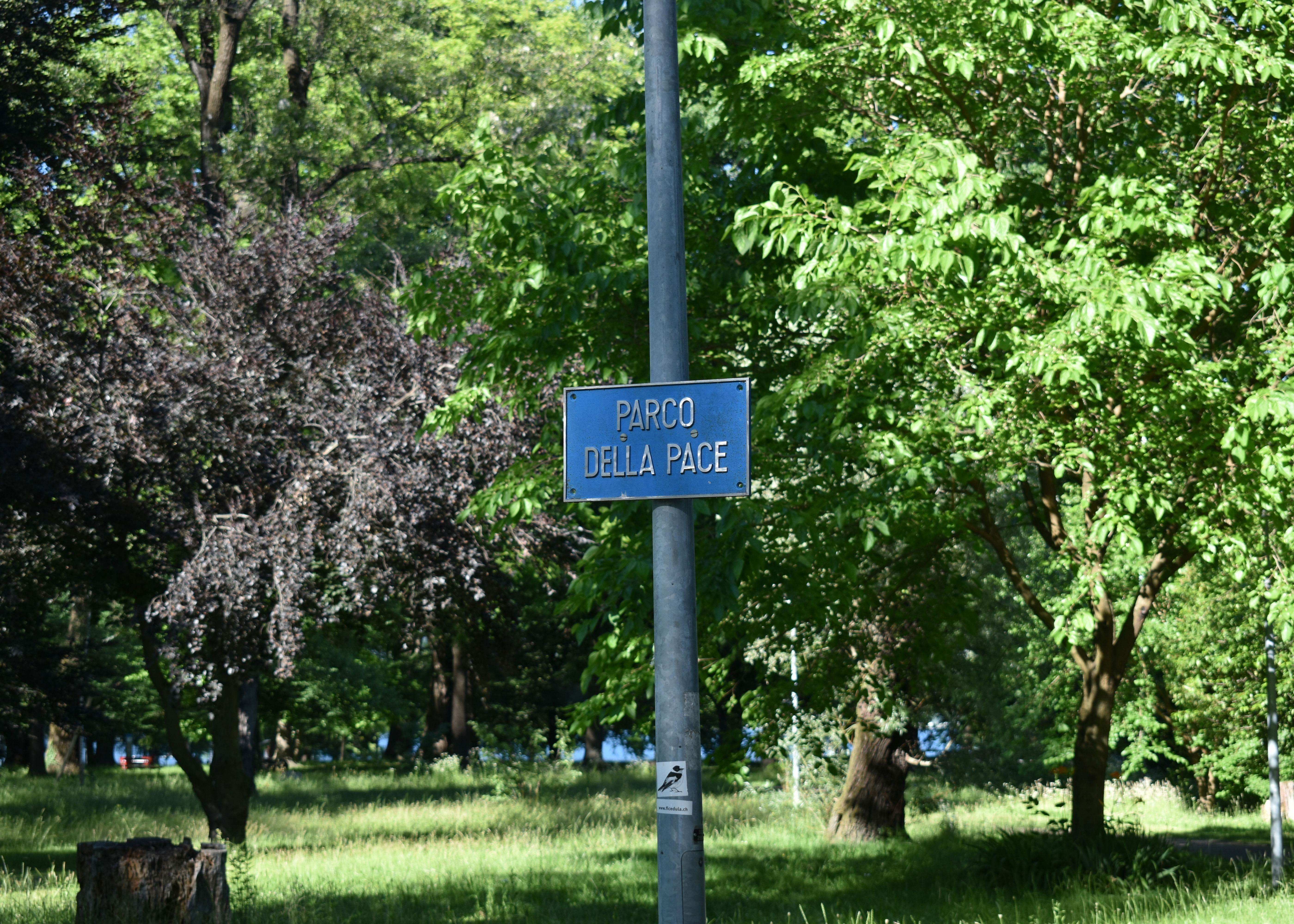
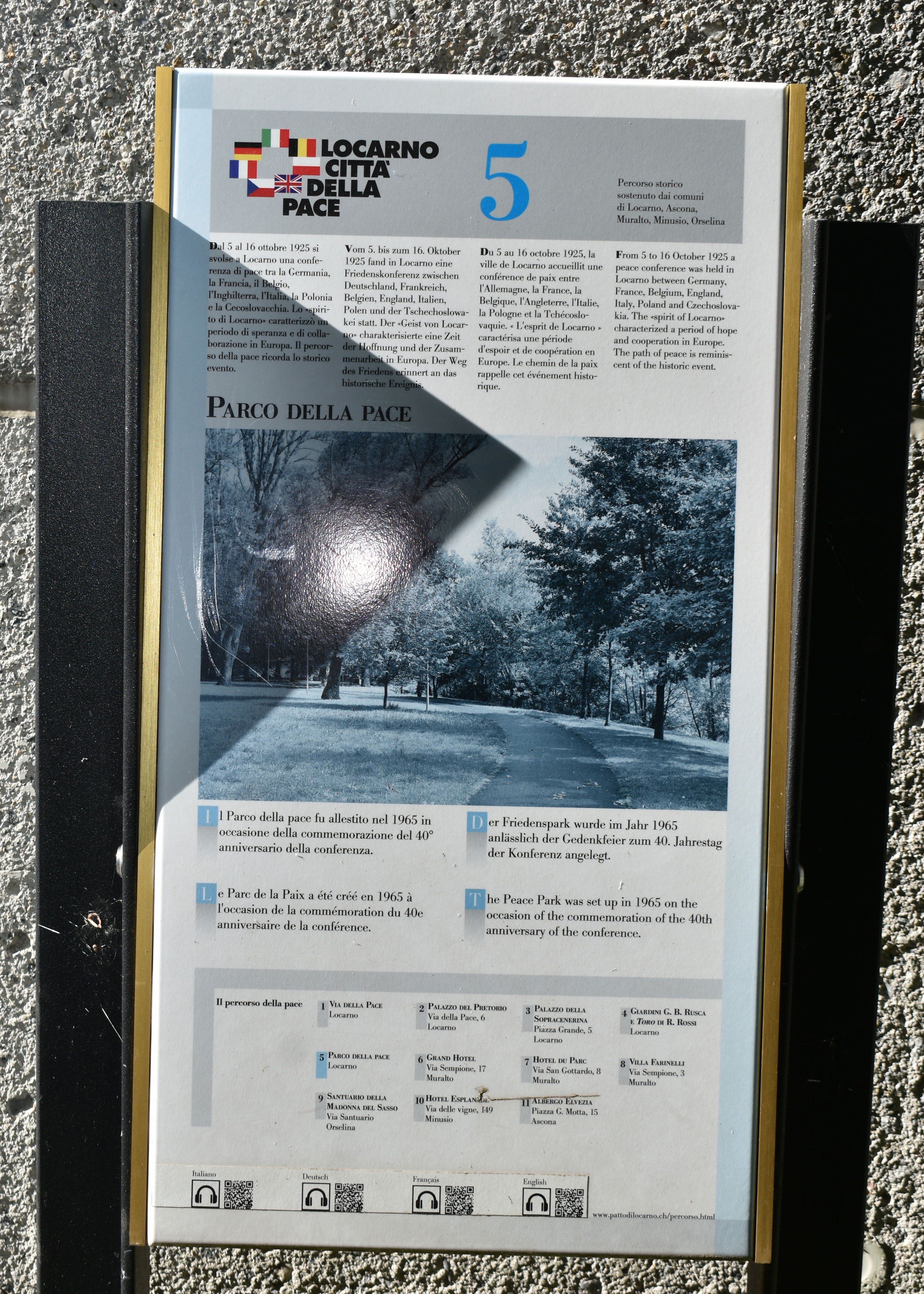
"The start or end of the Peace Trail- The Peace Park"
Having completed the Locarno Peace Trail, I found myself rather first. The World's nicest Public Lido, seemed to have a nice looking terrace , so I settled down on a sofa to enjoy a rather expensive but extremely tasty cocktail and lok at marvellous Lake View.
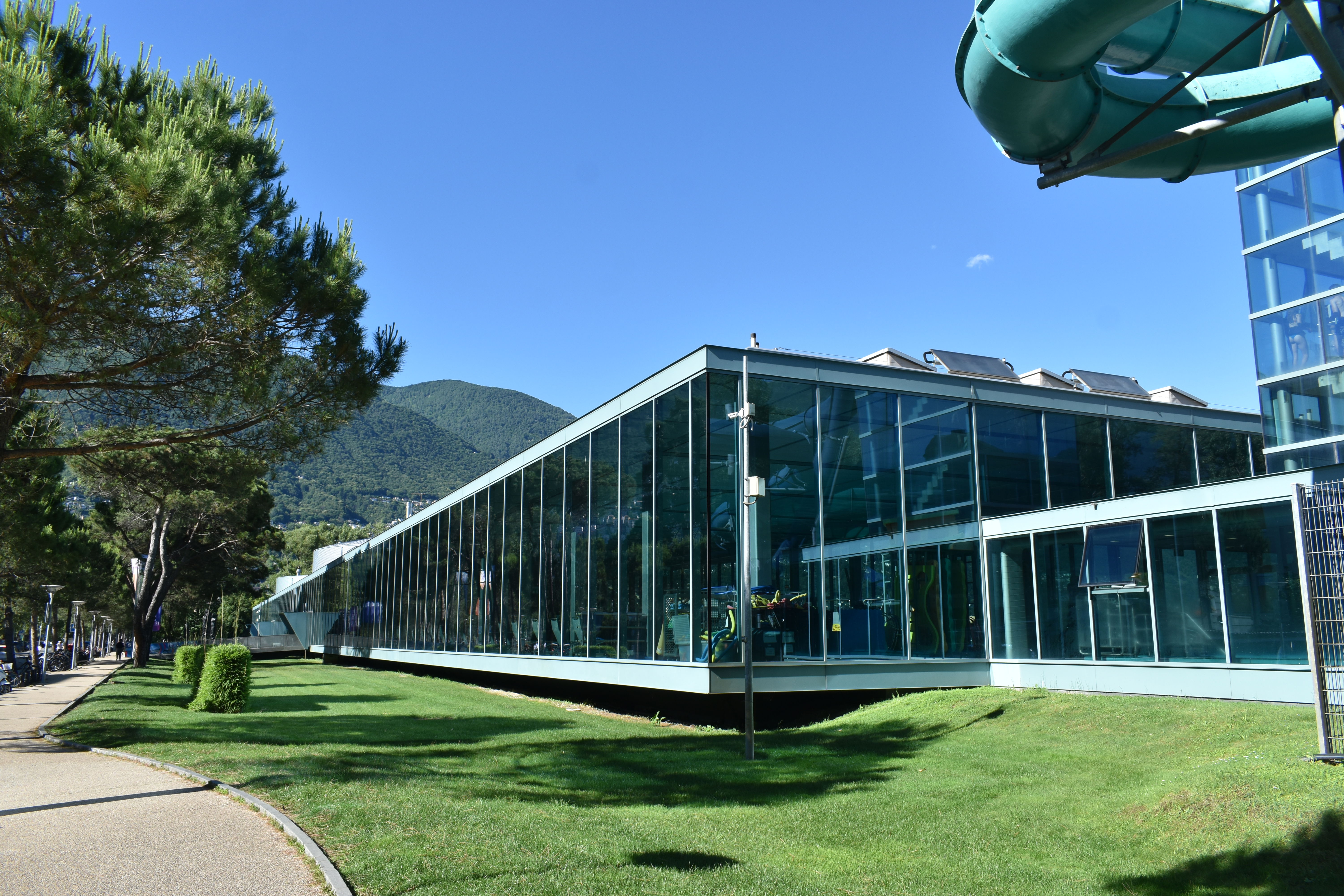
"The lovely Public Lido"